








Vol.3 No.3 october - december 2022 Affiliated With : fireworks business information Indonesia www.indopalmoil.com A Publication of : PRESIDEN INDONESIA MENGKAJI PROGRES PENELITIAN MINYAK GORENG KELAPA SAWIT MERAH DI MEDAN INDONESIA’S PRESIDENT REVIEWS PROGRESS OF RED PALM COOKING OIL RESEARCH IN MEDAN CAN REGENERATIVE AGRICULTURE REDUCE THE ENVIRONMENTAL HARM OF PALM OIL PRODUCTION? BILINGUAL : ENGLISH & BAHASA INDONESIA OCTOBER 20234-6 SANTIKA PREMIERE DYANDRA HOTEL & CONVENTION MEDAN - INDONESIA THE13TH EDITION OF 2023 THE WORLD'S LARGEST PALM OIL EVENT AT THE HEART OF THE INDUSTRY! INDUSTRY NETWORKING LUNCH Technology Seminars International Conference highlights of the event www.palmoilexpo.com 9th INDONESIA INTERNATIONAL PALM OIL CONFERENCE 2023 Incorporating : MORE ABOUT INDONESIA’S LARGEST PALM OIL EVENT TURN TO PAGE 25 +62 21 5088 2917 info@fireworksid.com *Cover Picture: Courtesy of JJ Lurgi











Incorporated in 1996 in Indonesia with the target to be one of the leading companies to provide distributed power in Indonesia, Kaltimex Energy was the pioneer company to obtain The First IPP license in the private sector to operate a 23 MW Power Plant, for a large textile company in Central Java. Since then, Kaltimex Energy has installed 500MW in Kalimantan, Sulawesi and Sumatera including for Rental (PLN), Palm Oil and Sugar sector
and Transfer (B.O.O.T ) basis or as an Independent Power Producer (IPP). Kaltimex Energy is also proud to ser ve the Palm Oil & Sugar Industr y in Indonesia, having installed more than 220 units of Siemens – Dresser Rand Steam Turbines, generating around 300 MW of electricity in total

With the development and the necessity to move towards greener and sustainable energy, Kaltimex Group is now actively developing Renewable Energy projects through the usage of Biogas,


implements international standards for Quality Management System, Environment Management System and Occupational Health & Safety Management System (HSE) to ensure that the ser vices delivered are best in the class




STEAM TURBINES
K altimex Energy represent the world’s leader in Steam Turbines; Dresser Rand (A Siemens owned business), for the non oil & gas market of Indonesia.Dresser Rand has one of the most comprehensive steam turbine selections in the industr y and provide solutions for paper mills, steel, sugar, district energy, marine and palm oil. Applications include combined c ycle, cogeneration, combined heat and power (CHP), biomass, and waste to energy K altimex Energy is proud of the over 200 units of Siemens Dresser Rand Steam Turbines it has successfully pack aged, installed & commissioned across Indonesia.
GAS ENGINES

Range from 400 kW to 4,500 kW In this way, it is possible to set up power plants with an output of up to

MWM's installations in Indonesia have reached more than 420 MW, spread across the countr y The amount has given a clear message that MWM's brand is proven and well accepted in Indonesia.


As a Total Power Solutions company, we have a higher calling to develop power plants from renewable energy sources, such as Municipal Solid Waste, Agricultural Waste
Waste K altimex Energy
to
Plants
any other Organic or
have
to
The Biogas after going through a

to
to
process
be directly to
and
Inorganic
is proud
announce that we
recently entered into an exclusive agreement with Wabio Technologie, GmbH
develop Biogas
biogas desulphurization
could
fed
Gas Engines
generate electricity. BIOGAS TECHNOLOGY Indonesia - Bangladesh - Singapore - Philippines - Myanmar PT. K ALTIMEX ENERGY Menara Kar ya Building 19th Floor, Unit G-H Jl. HR. Rasuna Said Blok X-5 Kav. 1-2 Jakar ta 12950 INDONESIA Phone : +62.21 5794.4600 (hunting) Fax : +62.21 5794.4609/10 Email Website : https://www.kaltimex-energy.com : kaltimex@kaltimex.co.id
EDITOR’S NOTE

Greetings readers,
It's an eventful month as PALMEX Indonesia 2022 is scheduled to open this October to a voracious crowd hungry for face to face events.
Indonesia is the world's largest producer for palm oil and as such, an event of a magnitude like PALMEX Indonesia would bring together a massive congregation of palm oil industry professionals, technology providers and policy makers alike after a 3 year hiatus.
Our team at Palm Oil Today Indonesia would be at the event distributing free print copies of the magazines and getting exclusive interviews with attendees there.
We look forward to seeing you in person at the event and do enjoy your personal copy of this latest edition of the magazine!

C M Y CM MY CY CMY K
Till the next edition! Cheerios! fireworks business information Indonesia Palm Oil Indonesia Today Digital Editions Available! Log on to: www.indopalmoil.com Managing Edito Susan Tricia Editorial Consultant Kenny Yong Content Editor Nur Atthirah Zawanah Azmee Media Executives Paulina Shu Graphic Designer Felicia Zhang Publications Manager Amelia Lim amelia@fireworksid.com c/o PT. Fireworks Indonesi a Jakarta Batam Publisher : +62 778 488 3726 indo@asiafbi.com Fireworks Business Information (FBI) Indonesia The content of Palm Oil Indonesia Today Magazine (and website) does not necessarily reflect the views of the editor or publishers and are the views of its contributors and advertisers. The digital edition may include hyperlinks to third-party content, advertising, or websites, provided for the sake of convenience and interest. The publishers accept no legal responsibility for loss arising from information in this publication and do not endorse any advertising or products available from external sources. Palm Oil Indonesia Today Magazine and its website does not warrant that the information in it will be error-free or will meet any particular criteria of performance or quality. Your use of the information contained in the Palm Oil Indonesia Today magazine and website is at your own risk. You assume full responsibility and risk of loss resulting from the use of this website or information in it. None of Palm Oil Indonesia Today, PT Fireworks Indonesia or its affiliates, or any partners, principals, stockholders or employees of any thereof will be liable for any special, indirect, incidental, consequential or punitive damages or any other damages whatsoever, whether in an action of contract, statute, tort (including, without limitation, negligence) or otherwise, relating to the use of this website or information contained in it. No part of this publication may be reproduced or stored in a retrieval system without the written consent of the publishers. All rights reserved. DISCLAIMER


























6 (BHS) : Indonesia berupaya meningkatkan kuota ekspor minyak kelapa sawit & campuran bahan bakar nabati dalam bahan bakar (ENG) : Indonesia looks to raise palm oil export quota & biodiesel mix in fuel


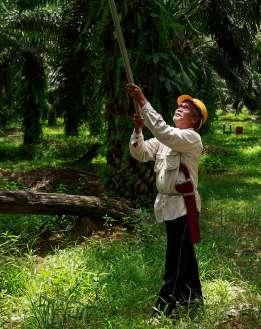



7 (BHS) : Malaysia melihat persaingan yang berkelanjutan bahkan saat Indonesia melanjutkan ekspor minyak kelapa sawit (ENG) : Malaysia sees sustained competitiveness even as Indonesia resumes palm oil exports
8 (BHS) : Tiongkok ingin berinvestasi di industri minyak kelapa sawit Sabah (ENG) : China keen to invest in sabah’s palm oil industry
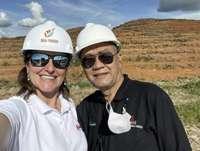

13 (BHS) : Krisis kelapa sawit global dapat meningkatkan sektor minyak kelapa sawit Nigeria (ENG) : Global oil palm crisis may boost Nigeria’s palm oil sector


15 (BHS) : Malaysia mencari solusi saling menguntungkan dengan UE terkait minyak kelapa sawit (ENG) : Malaysia seeks win-win solution with EU on palm oil
18 (BHS) : Penyedia layanan minyak kelapa sawit ecoscience akan menggalang hampir RM 24 juta pada IPO-nya (ENG) : Palm oil

CONTENTS // OCTOBER - DECEMBER 2022
support service provider ecoscience will raise close to rm24 mil in its IPO 19 (ENG) : Can regenerative agriculture reduce the environmental harm of palm oil production? 22 (BHS) : Bagaimana Afrika menanggung beban badai sempurna minyak kelapa sawit (ENG) : How Africa is bearing the brunt of palm oil’s perfect storm 28 (ENG) : An interview with the director of sustainability, Olivier Tichit 34 (BHS) : Presiden Indonesia mengkaji progres penelitian minyak goreng kelapa sawit merah di Medan (ENG) : Indonesia’s president reviews progress of red palm cooking oil research in Medan 35 (BHS) : Dewan minyak kelapa sawit Malaysia (Malaysia palm oil board / MPOB) memperkenalkan teknologi baru untuk komersialisasi (ENG) : Malaysia palm oil board (MPOB) introduces new technologies for commercialisation 26 (BHS) : Kekuatan minyak kelapa sawit berkelanjutan malaysia sering diabaikan (ENG) : Malaysian sustainable palm oil strengths often overlooked BERITA REGIONAL / REGIONAL NEWS BERITA DUNIA / WORLD NEWS ADVERTORIAL BERITA UTAMA / COVER STORY LAPORAN KHUSUS / SPECIAL REPORT IN THE HOT SEAT BERITA TEKNOLOGI / TECHNOLOGY NEWS BERITA KELANJUTAN / SUSTAINABILITY NEWS 12 (BHS) : Total solusi traktor italia penuhi permintaan industri sawit




























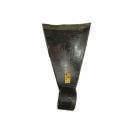

















J
AKARTA: Indonesia mengajukan untuk meningkatkan kuota ekspor minyak kelapa sawit pada hari Jumat dan sedang mempertimbangkan tingkat wajib bahan bakar nabati bagi petani di saat persediaan minyak kelapa sawit domestik tinggi, kata seorang menteri senior pada hari Sabtu.
Persediaan minyak kelap sawit membeludak dan pabrik membatasi pembelian tandan buah segar (TBS) dari petani sejak Jakarta menghentikan ekspor minyak kelapa sawit mentah dan beberapa turunannya selama tiga minggu hingga 23 Mei dalam upaya menahan lonjakan harga minyak goreng domestik.
Indonesia mengganti larangan tersebut dengan kewajiban pasar domestik (domestic market obligation / DMO), mewajibkan perusahaan untuk memasok sebagian produk mereka ke pasar domestik melalui program minyak makan curah, dan menghubungkan volume DMO dengan izin dan kuota ekspor perusahaan. Volume DMO pada akhir Juni ada sekitar 270.000 ton, kata pemerintah.
Pemerintah akan mengizinkan perusahaan yang telah menjual minyak kelapa sawit mereka dalam negeri untuk mengekspor sebanyak tujuh kali lipat angka penjualan dalam negeri mereka dari lima kali lipat saat ini, kata menteri senior Luhut Pandjaitan.
“Saya bertanya kepada Kementerian Perdagangan untuk meningkatkan faktor pengalian ekspor menjadi tujuh kali lipat mulai dari 1 Juli, dengan tujuan untuk meningkatkan harga TBS petani secara signifikan,” kata Luhut dalam sebuah pernyataan.
Pemerintah mengalokasikan 3,4 juta ton kuota ekspor minyak kelapa sawit selama “masa transisi” setelah larangan ekspor dan program percepatan ekspor. Namun, pengiriman masih terhitung lambat di mana kelompok industri minyak kelapa sawit Indonesia GAPKI mengatakan bahwa ekspor telah terhambat masalah keter sediaan kapal.
Sekjen GAPKI, Eddy Martono, pada hari Sabtu menyambut baik pelonggaran ekspor tersebut, mengatakan bahwa rasio ekspor yang lebih tinggi lebih dan dapat “mempercepat pengurasan tangki”.
Untuk menutup kelebihan persediaan dalam negeri, pemerintah juga akan menjalankan rencana menaikkan kadar campuran bahan bakar nabati wajib menjadi 35% hingga 40%, tergantung pada pasokan dan harga minyak kelapa sawut, dari 30% saat ini, kata Luhut.
J
AKARTA: Indonesia proposed raising palm oil export quotas on Friday and is considering increasing mandatory levels of biodiesel in fuel mixes to prop prices for farmers at a time when domestic palm oil inventories are high, a senior minister said on Saturday.

Palm oil inventories ballooned and mills limited purchases of fresh fruit bunches (FFB) from farmers after Jakarta stopped exports of crude palm oil and some other derivatives for three weeks to May 23 in a bid to contain soaring domestic cooking oil prices.
Indonesia replaced the ban with a domestic market obligation (DMO), requiring companies to supply a portion of their products to the domestic market through the government’s bulk cooking oil programme, and linked DMO volumes to companies’ export permits and quotas. DMO volumes as of the end of June were around 270,000 tonnes, the government said.
The government will now allow companies that have sold palm oil domestically to export seven times the amount of their domestic sales from currently five times, senior minister Luhut Pandjaitan said.
“I asked the Trade Ministry to increase the export multiplication factor to seven times starting July 1, with the main objective to increase farmer’s FFB prices significantly,” Luhut said in a statement.
The government allocated 3.4 million tonnes of palm oil export quotas under a “transition period” after the export ban and export acceleration programme. However, shipments have been slow with Indonesian palm oil industry group GAPKI saying exports had been hampered by issues finding ships.
The secretary general of GAPKI, Eddy Martono, on Saturday welcomed the export easing, saying a higher export ratio was better and could “speed up tank drain”
To sop up excess domestic inventory, the government will also exercise a plan to raise mandatory biodiesel mix levels to 35% or 40%, depending on crude palm oil supply and price, from 30% currently, Luhut said.
www.indopalmoil.com
6 REGIONAL NEWS
INDONESIA BERUPAYA MENINGKATKAN KUOTA EKSPOR MINYAK KELAPA SAWIT DAN CAMPURAN BAHAN BAKAR NABATI DALAM BAHAN BAKAR
INDONESIA LOOKS TO RAISE PALM OIL EXPORT QUOTA AND BIODIESEL MIX IN FUEL
K
UALA LUMPUR: Dimulainya kembali ekspor minyak kelapa sawit Indonesia tidak akan menumpulkan daya saing ekspor minyak nabati Malaysia, kata menteri komoditas Malaysia sambil menunjukkan hilangnya penjualan saingannya di India.
Menteri Zuraida Kamaruddin mendesak “semua petani kelapa sawit Malaysia baik perusahaan perkebunan maupun petani kecil untuk tidak terlalu khawatir dengan perkembangan belakangan ini”
Indonesia adalah produsen terbesar minyak kelapa sawit terbesar, dan Malaysia di urutan kedua. Harga segala jenis minyak nabati telah mencapai rekor tertunggu tahun ini karena perang di Ukraina telah mengganggu pasokan salah satunya, yaitu minyak bunga matahari.
Khawatir dengan kenaikan harga minyak goreng dalam negeri, Jakarta pada tanggal 28 April memberlakukan larangan ekspor minyaka kelapa sawit, tetapi pada hari Kamis mengatakan bahwa larangan tersebut akan berakhir pada tanggal 23 Mei. Kemudian pada hari Jumat, pemerintah Indonesia mengatakan bahwa produsen masih harus menjual cukup banyakminyak kelapa sawit di dalam negeri untuk mempertahankan persediaan dalam negeri mencapai 10 juta ton.
India, secara tradisional mendapatkan dua pertiga minyak kelapa sawitnya dari Indonesia, telah dipaksa untuk mendapatkan lebih banyak dari Malaysia dan Thailand, sementara importir lainnya yang frustasi mengatakan bahwa mereka akan mengu rangi ketergantungan pada pasokan Indonesia yang tidak dapat diprediksi.
“Kebijakan Indonesia bisa menguntungkan Malaysia ...,” kata Zuraida, menteri industri perkebunan dan komoditas. Kebijakan pengedalian ekspor Indonesia “memungkinkan (Malaysia) menjadi pemasok utama ke India”, katanya.
Pernyataannya berjudul: “Malaysia tidak akan kehilangan daya saing meskipun Indonesia mengangkat larangan ekspor”.
Zuraida mengatakan bahwa kementeriannya tidak memperkirakan penyesuaian penurunan harga minyak kelapa sawit mentah yang besar menyusul pengumuman kebijakan terbaru Indonesia.
Harga akan tetap pada tingkat yang tinggi karena ketidakpastian produksi minyak nabati lainnya sebagai akibat ketegangan geopolitik dan cuaca yang tidak menguntungkan, tambahnya.
Kementerian Zuraida sedang berbicara dengan menteri keuangan mengenai proposal untuk sementara memangkas bea cukai ekspor minyak kelapa sawit mentah sebanyak setengahnya untuk membantu mengisi kekurangan minyak nabati global dan meningkatkan pangsa pasar Malaysia, katanya kepada Reuters dalam sebuah wawancara pekan lalu.
MALAYSIA SEES SUSTAINED COMPETITIVENESS EVEN AS INDONESIA RESUMES PALM OIL EXPORTS
K
UALA LUMPUR: Indonesia’s resumption of palm oil exports will not blunt Malaysia’s competitiveness in exporting the edible oil, the Malaysian commodities minister said pointing to the rival’s loss of sales in India.
Minister Zuraida Kamaruddin urged “all Malaysian oil palm growers both plantation firms and smallholders alike not to be unduly concerned with the recent development”.
Indonesia is the largest producer of palm oil, with Malaysia second. Prices of all kinds of edible oils have hit record highs this year because the war in Ukraine has disrupted supply of one of them, sunflower oil.
Alarmed by a rise in domestic cooking oil prices, Jakarta on Apr 28 banned exports of palm oil, but said on Thursday the ban would end on May 23. Then on Friday, the Indonesian government said producers would still have to sell enough locally to maintain a domestic stock of 10 million tonnes.
India, traditionally getting two-thirds of its palm oil from Indonesia, has been forced to buy more from Malaysia and Thailand, while other frustrated importers have said they would decrease reliance on unpredictable Indonesian supplies.
“Indonesia’s policies could well work to Malaysia’s advantage ...,” said Zuraida, the minister for plantation industries and commodities. Indonesia’s export control policies “would enable (Malaysia) to emerge a dominant supplier to India”, she said.
Her statement was headed: “Malaysia will not lose competitive edge as Indonesia resumes palm oil export”.

Zuraida said her ministry did not expect a big downward adjustment to crude palm oil prices following Indonesia’s latest policy announcements.
Prices would remain at elevated levels due to uncertainties in the production of major oilseeds as a result of geopolitical tensions and unfavourable weather, she added.
Zuraida’s ministry is talking to the finance ministry about a proposal to temporarily cut an export tax on crude palm oil by as much as half to help fill the global shortage of edible oil and boost Malaysia’s market share, she told Reuters in an interview last week.
www.indopalmoil.com Palm Oil Today Indonesia October - December 2022 7REGIONAL NEWS
MALAYSIA MELIHAT PERSAINGAN YANG BERKELANJUTAN BAHKAN SAAT INDONESIA MELANJUTKAN EKSPOR MINYAK KELAPA SAWIT
TIONGKOK INGIN BERINVESTASI DI INDUSTRI MINYAK KELAPA SAWIT SABAH
CHINA KEEN TO INVEST IN SABAH’S PALM OIL INDUSTRY
Tiongkok tertarik untuk menjajaki peluang investasi di industri minyak kelapa sawit Sabah. Hal ini merupakan salah satu bidang yang ingin dijajaki oleh pemerintah Tiongkok, Menteri Luar Negeri Tiongkok Wang Yi mengatakan pada Wakil Menteri Sabah Datuk Sri Jeffrey Kitingan dalam pertemuan pada tanggal 4 Juni.
Kedua pemimpin membahas potensi hubungan perdangangan bilateral dan potensi investasi ke negara bagian Kalimantan karena Tiongkok dan Sabah sepakat untuk menjalin hubungan perekonomian dan kebudayaan yang lebih dekat. Mereka juga membahas isu-isu teknologi di berbagai bidang khususnya di industri pertanian dan perikanan.
Kitingan, yang juga merupakan Menteri Perikanan dan Pertanian, mengatakan kepada Wang tentang rencana pemerintah Sabah untuk mengurangi kemiskinan di daerah pedesaan di negara bagian tersebut, yang mencakup pembangunan infrastruktur, khususnya di telekomunikasi, untuk mempercepat pertumbuhan perekonomian digital Sabah.
Berterima kasih kepada Wang karena telah memilih Sabah sebagai salah satu tempat persinggahannya, dia juga menawarkan untuk menyambut lebih banyak turis Tiongkok untuk mengunjungi Negeri di Bawah Angin tersebut.
Sebagai tanggapan, Wang mengatakan bahwa pemerintah Tiongkok selalu terbuka untuk bekerja sama dengan tetangganya dan bahwa pemerintah Tiongkok dan Sabah telah menikmati hubungan baik dan bersahabat selama bertahun-tahun.
Dalam hal infrastruktur, dia mengatakan bahwa Tiongkok bersedia untuk mendukung proyek-proyek yang menguntungkan kedua negara dan berkontribusi untuk mewujudkan impian dan aspirasi Sabah.
Kedua belah pihak setuju untuk mengembangkan panduan untuk menyusun agenda bilateral dengan tujuan memperkuat ikatan perekonomian dan budaya serta berkontribusi terhadap perdamaian dan keamanan di Sabah. “Itu adalah percakapan yang hangat dan konstruktif, dan saya senang dengan cara diskusi ini berlangsung,” kata Kitingan dalam sebuah pernyataan.
“Saya senang dengan banyaknya kemungkinan di mana Tiongkok dapat membantu mendorong Sabah menuju masa depan dan saya menantikan diskusi yang lebih mendalam dengan pemerintah Tiongkok dalam waktu dekat.”
China is keen to explore investment opportunities in Sabah’s palm oil industry. This is among the areas the Chinese government is interested to tap into, Chinese Foreign Minister Wang Yi told Sabah Deputy Chief Minister Datuk Seri Dr Jeffrey Kitingan in a meeting here on June 4.
The two leaders discussed potential bilateral trade ties and potential investments into the Bornean state as China and Sabah agreed to forge closer economic and cultural links. They also covered issues on technology transfers in various fields particularly in the agriculture and fisheries industries.
Kitingan, who is also State Fisheries and Agriculture Minister, told Wang of the Sabah government’s plans to reduce poverty in the rural areas in the state, which includes building more infrastructure, particularly telecommunications, to accelerate the growth of Sabah’s digital economy.
Thanking Wang for choosing Sabah for his stopover, he also offered to welcome more Chinese tourists to come to the Land Below the Wind.
In response, Wang said that the Chinese government was always open to cooperation with its neighbours and that the Chinese and Sabah governments have enjoyed cordial and amicable relations for many years.
In terms of infrastructure development, he stated that China is willing to support any project that benefits both countries and contributes to the realisation of Sabah’s dreams and aspirations.
Both parties agreed to develop a new road map to structure a new bilateral agenda with the goal of strengthening economic and cultural ties and contributing to peace and security in Sabah.
“It was a warm and constructive conversation and I am pleased with the respectful manner in which the discussion took place,” Kitingan said in a statement.
“I am excited at the many possibilities where China could help propel Sabah into the future and I look forward to a more in-depth discussion with the Chinese government soon.”

www.indopalmoil.com
8 REGIONAL NEWS
Kitingan (kanan) sedang berdiskusi dengan Wang. Kitingan (right) having a discussion with Wang.



June 2023 Sandakan Community Hall Reach Out to Malaysia's Largest Palm Oil Industry, at The Heart of The Industry! EXHIBITION ORGANIZED BY: OFFICIAL MEDIA: 1-2 +6011-1143 0726 (WhatsApp) info@ reworksmy.com EXHIBITION ENQUIRIES: www.palmoilfair.com SABAH EDITION
TOTAL SOLUSI TRAKTOR ITALIA PENUHI PERMINTAAN INDUSTRI SAWIT


Traktor Erreppi Buffal dirancang untuk semua medan dengan menjaga kelestarian lingkungan, memberikan solusi inovasi, terutama daya lebih kuat dan kompeksi rendah serta penggunaan yang serbaguna
Penulis: Elena Proietti & Arlimda Arkeman
Seiring dengan kebutuhan minyak nabati dunia, industri minyak sawit memiliki prospek yang cerah. Dapat diprediksi pada tahuntahun mendatang permintaan minyak sawit akan terus meningkat. Namun di sisi lain, industri sawit Indonesia juga menghadapi tantangan yaitu dengan adanya regulasi moratorium. Melalui regulasi tersebut, pelaku usaha sawit diharapkan tidak lagi melakukan ekspansi lahan untuk meningkatkan produktivitas, melainkan harus meningkatkan produksi dan produktivitas dengan lahan yang ada.
Lalu bagaimana pelaku usaha sawit berupaya dalam meningkatkan produksi dan produktivitasnya? Tentunya berbagai hal dapat dilakukan mulai dari bibit, perawatan hingga manajemen panen dengan pendukung alat panen atau dukungan mekanisasi. Kondisi tersebut menjadi daya tarik bagi produsen produk sebagai pendukung mekanisasi di pertanian khususnya perkebunan kelapa sawit untuk memasukkan produknya ke Indonesia sebagai produsen minyak sawit terbesar di dunia. Demikian pula, produsen alat angkut di perkebunan kelapa sawit dengan merek Erreppi asal Italia. Market Development Manager, SEA & Africa Country, Ir. Arlimda Arkeman, MT mengungkapkan pihaknya sejak 2004 sudah mulai mengenalkan alat angkut (Traktor Erreppi) di perkebunan kelapa sawit di Indonesia dan Malaysia. “Alat panen ini biasa disebut Buffalo”.
bagi banyak petani di berbagai sektor, terutama yang hemat konsumsi bahan bakar dan tanpa terjadi pemadatan tanah,” ujar Ir.Arlimda Arkeman. MT yang merupakan alumni Jurusan Teknik Mesinn Fakultas Teknologi Industri Universitas Trisakti Jakarta. Menurutnya, traktor Erreppi dibuat oleh Proietti(Paolo).
“Di kalangan petani kebun Kelapa Sawit merupakan alat angkut di dalam lahan (infield collection equipment). Bahkan, kami mengklaimnya sebagai alat mekanisasi yang petama diperkenalkan pada industri perkebunan kelapa sawit di Indonesia dan Malaysia,” jelas beliau dalam keterangan tertulis yang diterima redaksi Majalah Sawit Indonesia, beberapa waktu lalu.
Selanjutnya, Arlimda menguraikan alat angkut (Errepi) terlahir dari aktifitas Pertanian dan perkebunan. Traktor Erreppi Buffalo, dirancang untuk semua medan, dengan menjaga kelestarian lingkungan, memberikan solusi inovasi, terutama daya lebih kuat dan kompeksi rendah serta penggunaan yang serbaguna adalah suatu keharusan. “Efisien, terjangkau dan mudah dirawat, prototipe pertama traktor khusus ini diluncurkan pada awal tahun 2000-an, sebagai solusi mekanis untuk pengumpulan buah sawit atau Tandan Buah Sawit (TBS) di sektor perkebunan kelapa sawit. Dan kini ada jawaban inovasi
Beliau menciptakan mesin kecil untuk membagi beban TBS yang akan dievakuasi ke gerbong kecil dan melakukan siklus/ putaran yang sesering mungkin untuk mendapatkan kualitas TBS yang lebih tinggi per siklus, dengan produktivitas harian yang tinggi sesuai harapan pasar. “Skema yang luar biasa namun sesederhana ini awalnya sebuah rancangan yang memberikan hasil karya berupa produk yang sekarang dikenal sebagai Buffalo™. Terlebih lagi dari 5.000 unit saat ini bekerja di seluruh dunia termasuk Indonesia, Papua Nugini, Malaysia, Amerika Tengah dan Selatan dan kini dianggap sebagai pelopor dan pemimpin dalam traktor untuk mengangkut TBS di perkebunan kelapa sawit,” jelas Arlimda.
TRAKTOR ERREPPI



Dirancang sesuai dengan Prinsip KISS (Keep-It-Simple, Stupid/ alat yang sederhana dan tidak terlalu canggih) agar cocok dengan pengguna di Malaysia, Indonesia dan pengguna wilayah lainnya. Operasi sederhana, perawatan yang mudah, efisiensi, traksi konstan, keandalan, keamanan, kemampuan manuver, rentang kecepatan yang baik, berpenggerak empat roda 4×4 on / off, perawatan lingkungan, kemudahan perbaikan, ringan, konsumsi bahan bakar rendah dan tidak ada pemadatan tanah. Serta, memberikan kombinasi sempurna dari semua persyaratan ini, merekayasa generasi traktor baru. Hanya 3,5 liter (1,6 galon) bahan bakar yang diperlukan per hari untuk menjalankan Buffalo selama 8 jam.

Palm Oil Today Indonesia October - December 2022 www.indopalmoil.com 10 ADVERTORIAL
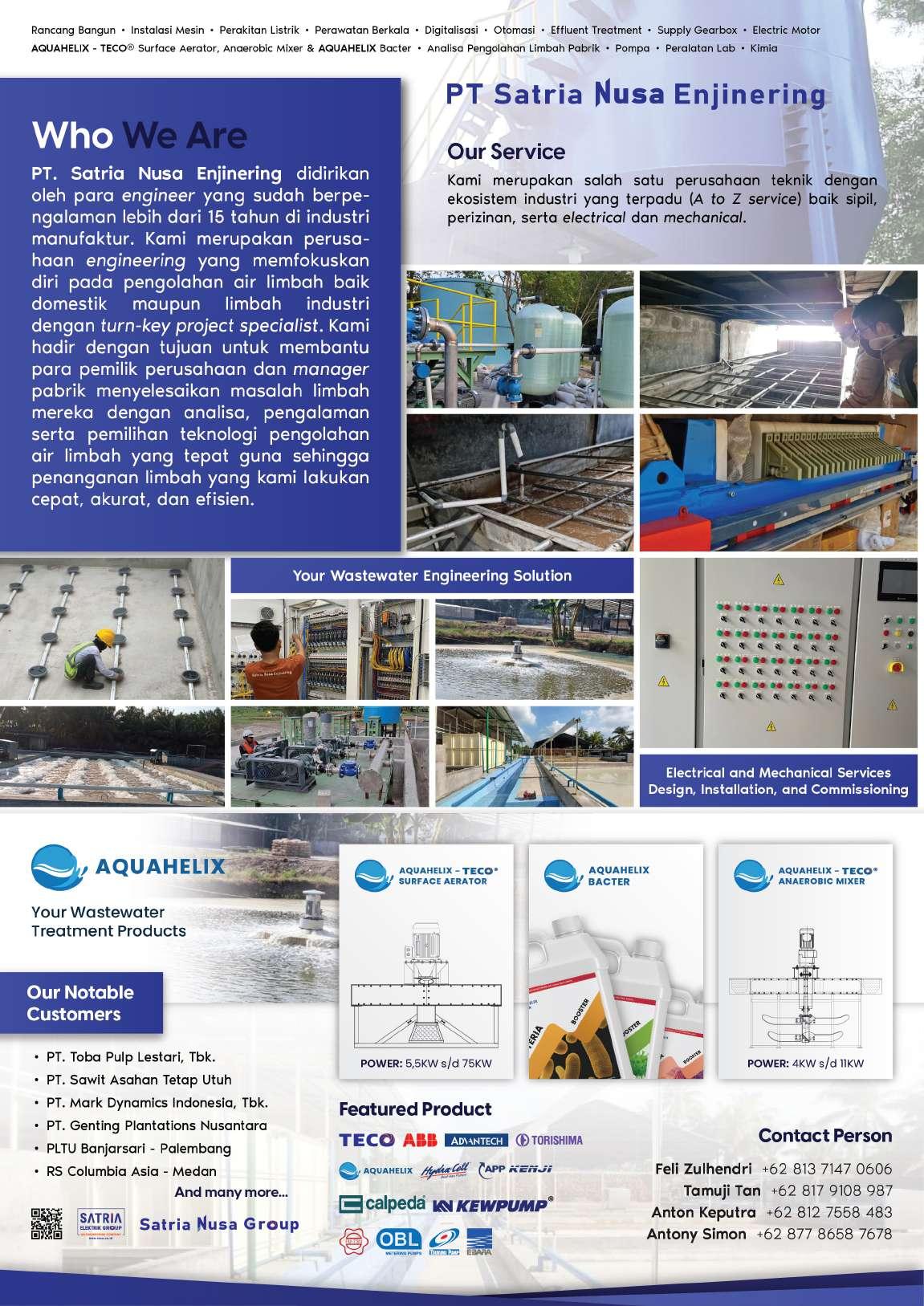
Hanya 0,84 kg/cm2 (12 psi) tekanan pada tanah, pemadatan yang sangat kecil , HP yang digunakan sepertiga dari 30kW (40hp) traktor. Erreppi-Buffalo telah digunakan secara luas di perkebunan kelapa sawit di Indonesia dan Malaysia serta telah mampu membuktikan ketangguhannya. “Yang menambah daya pikat Buffalo adalah sangat mudah untuk dikendarai dan bermanuver (memiliki dasar panel kontrol dan posisi pengendara dengan ergonomis tinggi). Untuk alasan ini, beberapa pengemudi terbaik sering kali wanita, berkat kaki lembut mereka saat menggunakan mesin. Pengalaman telah menunjukkan pengemudi ini memiliki rasa tanggung jawab yang sangat tinggi untuk mencapai target kinerja sehari-hari,” ungkap Arlimda.


Sejak tahun 2004, Errepi generasi pertama, masih menggunakan manual starter untuk menghidupkan mesinnya, rop starter. Namun, saat ini sudah menggunakan electrical starter. Sehubungan dengan nilai tambah yang diperoleh pelaku usaha kebun Kelapa Sawit dengan menggunakan traktor Erreppi, Arlimda menegaskan hemat bahan bakar, manuverability sehingga meningkatkan produksi per harinya bisa mencapai 25 tons TBS. Untuk fertilizer seharinya bisa memupuk hingga 25Ha. “Untuk type HR bisa langsung loading ke Bin 10-12tons di TPH dengan tinggi buang 230cm sehingga tidak terjadi double handling. Kehandalan produk dari Eropa dgn kualitas material yang sangat bagus serta memberikan Life time yang panjang,” tegasnya. “Ringan dan kuat ditambah dengan penggunaan ban LGP, sehingga alat ini sangat bersahabat dengan tanah pertanian yang harus dijaga kesuburannya. Compact design dengan turning radius yang kecil sehingga memudahkan kerja dalam blok atau pasar pikul. Mudah dioperasikan sehingga operator wanita sangat cocok untuk alat ini, dan pasangan keluarga di kebun dapat memberikan support bagi perusahaan dengan bekerjanya suami dan istri, yang membuat biaya buruh menjadi lebih efisien,” lanjut Arlimda.

Traktor Erreppi dengan konsep Buffalo adalah maverick dibandingkan dengan metode konvensional. Dirancang dengan inovasi, efisiensi dan aplikasi baru. Dibuat dengan penggerak empat roda 4WD ( four wheel drive ) menggunakan ban Low Ground Pressure (lebih dikenal dengan sebutan Low Ground Pressure Tyre/ LGP), serta disematkan system osilasi pivot yang membuat alat ini lebih fleksibel dalam manuver dilahan off road. Menggunakan Engine silinder tunggal berbahan bakar Diesel dan berpendingin udara dari merek yang sudah sangat terkenal Yanmar dengan kekuatan 11.3Hp. Penggunaan transmission full sincronize (sikromes) sehingga tak usah berhenti dulu untuk memindahkan giginya situasi ini sama persis seperti porsneleng mobil 4 gigi maju ditambah satu mundur.

Ditambahkan oleh Arlimda alat ini menggunakan gardan yang kokoh dengan penampangnya tidak terlalu besar. “Konsep Erreppi ini merujuk pada alat infield yang seringan mungkin sehingga ga wangan atau pasar pikul terhindar dari kompeksi atau pemadatan tanah yang nantinya akan mengurangi kesuburan tanah tersebut serta mengakibatkan peresapan pupuk tidak maksimal.” Pemasaran Erreppi Buffalo awalnya masuk Malaysia untuk mendukung mekasinasi pemungutan TBS ke dalam lahan. Sekitar tahun 2004, traktor Erreppi generasi pertama dipasarkan. Ada beberapa tipe Erreppi yang masuk di pasaran Indonesia dan Asia Tenggara. Se lain itu, dapat juga difungsikan sebagai Flat deck, utility vehicle yang digunakan untuk membawa bibit kelapa sawit siap tanam. “Erreppi di negara asalnya (Italia) digunakan sebagai utility vehicle di kebun-kebun mereka, kemudian dirancang ulang dengan merujuk pada kebutuhan customers di industri perkebunan sawit dengan segala kekhasannya sebagai tanaman yang tumbuh di wilayah khatulistiwa ini,” jelas Arlimda.
Traktor Erreppi dipasarkan melalui dealer, sistem multi dealer baik di Indonesia atau pun di Malaysia. Dealer adalah perusahaan yang juga mengageni alat-alat berat dan alat-alat pertanian yang bertaraf nasional atau pun regional. Ketersediaan spare parts dan mekanik yang handal ada di setiap dealer. “Kami pun mem perkenalkan sistem modul untuk komponen-komponen Erreppi, sehingga waktu tunggu di lapangan bisa ditekan seminimal mungkin, pemasangan komponen modular sangat mudah. Dengan sistem ini kami berharap pemasaran alat kami akan semakin berkembang pesat. Untuk training kami dari pusat saat ini sudah memunyai perwakilan untuk wilayah Asia Tenggara dan Afrika yang berdomisili di Indonesia,” tutup Arlinda dalam penjelasannya.

Palm Oil Today Indonesia October - December 2022 www.indopalmoil.com 12 ADVERTORIAL
DIRANCANG SANGAT INOVATIF Ir. Arlimda Arkeman. MT. Market Development Manager SEA & Africa Country a.arkeman@erreppi.com Mobile : +62 813 8172 0233 Viia dell’Industria, 2 - Z.I. 06031 Bevagna (P’g) - Italy T. +39 0742 36 05 92 r.a F. +39 0742 36 08 10 www.erreppi.com info@erreppi.com
KRISIS KELAPA SAWIT GLOBAL DAPAT MENINGKATKAN SEKTOR MINYAK KELAPA SAWIT NIGERIA
A
da peningkatan upaya lokal untuk memungkinkan Nigeria memanfaatkan larang ekspor minyak kelapa sawit Indonesia, karena negara-negara pesaing masuk dan memperluas pangsa pasarnya.
Baru-baru ini, Presiden Indonesia Joko Widodo mengumumkan larangan ekspor total semua minyak kelapa sawit, baik yang mentah maupun yang olahannya, untuk mengatasi kenaikan harga dalam negeri. Harga minyak kelapa sawit dapat mencapai rekor tertinggi senilai 8.100 Ringgit ($1.938) per ton menyusul anjloknya persediaan minyak nabati dan penurunan surplus ekspor, termasuk dampak perang di Ukraina.
Larangan itu sudah membuat harga minyak goreng melonjak lebih tinggi di seluruh dunia, memperburuk ketakutan keamanan pangan global di tengah cuaca buruk dan perang di Ukraina.
Analis mengatakan bahwa harga minyak kelapa sawit global telah meningkat di beberapa bulan terakhir, di mana minyak nabati lainnya termasuk bunga matahari dan kedelai pada lintasan yang sama, mendorong indeks harga minyak nabati Organisasi Pangan dan Pertanian PBB ke rekor tertinggi pada bulan Februari puncak yang terus meningkat.
Berbicara dengan The Nation, Ketua Eksekutif Institusi Pelatihan Pengelolaan Pangan dan Perdesaan (Agricultural and Rural Management Training Institute / ARMTI), Dr Olufemi Oladunni mengatakan bahwa larangan ekspor minyak kelapa sawit Indonesia telah membuka pintu bagi Nigeria untuk memperluas pangsa pasarnya.
Menurut dia, Nigeria dapat diuntungkan dari larangan ekspor minyak kelapa sawit Indonesia dan meraup keuntungan ekspor yang lebih tinggi tahun ini.
Saat ini, mitra impor utama Indonesia seperti Tiongkok dan Filipina telah menunjukkan kehawatiran dengan langkah yang memungkinkan akan menyebabkan gangguan dan memperburuk kenaikan harga komoditas pangan, yang sudah mencapat tingkat tertinggi 10 tahun terakhir dalam indeks Organisasi Pangan dan Pertanian.
Nigeria berada di posisi kelima. Malaysia menyumbang 31 persen pasokan minyak kelapa sawit, berada di peringkat kedua di bawah Indonesia dengan pasokan sebesar 56%.
Presiden Nasioanal Asosiasi Produsen Minyak Kelapa Sawit Nigeria (National Palm Producers Association of Nigeria / NPPAN), Amb Alphonsus Inyang mengatakan bahwa asosiasinya sedang bekerja untuk meningkatkan distribusi bibit kelapa sawit.
Inyang mengatakan kepada The Nation, bahwa asosiasinya sedang berupaya meningkatkan setiap keluarga di seluruh negeri untuk menanam setidaknya 20 bibit kelapa sawit.
Inyang, mengatakan bahwa Nigeria dapat menjadi mandiri dalam produksi kelapa sawit jika beberapa langkah dilakukan oleh pemerintah dan pemangku kepentingan lainnya.

Namun dia mengatakan bahwa untuk mencapai swasembada ada kebutuhan untuk program di mana bibit, pupuk dan bahan kimia pertanian lainnya, akan tersedia bagi petani, mendesak pemerintah untuk bermitra dengan asosiasi dalam mengimplemen tasikan Proyek Satu Keluarga Dua Puluh Sawit, di mana mereka memberikan dua puluh bibit dan pupuk kepada setiap keluarga.
Dia juga meminta pemerintah negara bagian untuk bermitra dengan NPPAN dalam memasukkan program, menambahkan bahwa beberapa negara bagian dapat menanam 5 juta pohon kelapa sawit, sekitar 2 juta, dan 3 juta pohon kelapa sawit lainnya.
Menurut Inyang, pohon kelapa sawit yang ditanam akan bisa dipanen hingga 50 tahun; satu hektar pohon kelapa sawit akan memberikan keuntungan minimal N 2 juta mulai dari tahun ketiga.
www.indopalmoil.com Palm Oil Today Indonesia October - December 2022
Kesempatan bagi Nigeria saat Indonesia melarang ekspor minyak kelapa sawit Nigeria’s opportunity as Indonesia bans palm oil
13WORLD NEWS
GLOBAL OIL PALM CRISIS MAY BOOST NIGERIA’S PALM OIL SECTOR

There are increased local efforts to enable Nigeria take advantage of Indonesia’s palm oil export ban, as competing countries swoop in and expand its market share.
Recently, Indonesian President Joko announced a total export ban on all palm oil, both crude and refined/processed, out of the country to tackle local price hikes. Palm oil prices could hit a record 8,100 ringgit ($1,938) a tonne following a plunge in global edible oil stocks and a decline in export surpluses, including the impact of war in Ukraine.
Already, the ban is sending soaring cooking oil prices even higher worldwide, exacerbating global food security fears amid adverse weather and the war in Ukraine.
Analysts said global palm oil prices have soared in recent months, with other vegetable oils including sunflower and soy on similar trajectories, driving the UN Food and Agriculture Organization’s vegetable oil price index to a record high in February a peak that has continued to rise.
Speaking with The Nation, Chief Executive, Agricultural and Rural Management Training Institute (ARMTI), Dr Olufemi Oladunni said the Indonesia’s palm oil export ban has left the door open for Nigeria to expand its market share.
According to him, Nigeria could benefit from Indonesia’s palm oil ban and reap higher export profits this year.
Currently, Indonesia’s major import partners such as China and the Philippines have shown concerns with the move likely to cause disruption and exacerbate price rises in food commodities, which were already running at 10-year highs in the Food and Agriculture Organization’s index.
Nigeria the fifth. Malaysia accounts for 31 per cent of global palm oil supply, second after Indonesia’s 56 per cent.
National President, National Palm Producers Association of Nigeria (NPPAN) , Amb Alphonsus Inyang said the association is working on increasing distribution of oil palm seedlings.
Inyang told The Nation, the association, is encouraging each family across the country to plant at least 20 oil palm seedlings.
Inyang, stated that Nigeria can become self-sufficient in the production of oil palm if some measures are put in place by government and other stakeholders.
He however said to achieve self-sufficiency there is a need for a programme where seedlings, fertilisers and other agro chemicals, will be made available to farmers ,urging the government to partner the association in the implementation of its One Family Twenty Palm Project’, where they give twenty seedlings and fer tilisers to families.
He also called on state governments to partner with NPPAN in keying into the programme, adding that some states can plant 5 million oil palm trees, some 2 million, and another 3 million oil palm trees.
According to Inyang, palm trees when planted will be harvested up to 50 years one hectare of palm trees will give a minimum profit of N2 million from the third year.
Palm Oil Today Indonesia October - December 2022 www.indopalmoil.com 14 WORLD NEWS
MALAYSIA MENCARI SOLUSI SALING MENGUNTUNGKAN DENGAN UE TERKAIT MINYAK KELAPA SAWIT
Menteri Industri Perkebunan dan Komoditas Datuk Zuraida Kamaruddin mengatakan bahwa Malaysia berharap dapat menyalurkan berbagai informasi tentang industri kelapa sawit, khususnya dari sisi kesehatan dan nutrisi serta keberlanjutan, untuk memperbaiki kesalahpahaman terhadap minyak kelapa sawit dan produkproduknya, sebagaimana dibuktikan dalam kampanye anti minyak kelapa sawit di UE.

Malaysia bertekad untuk membina hubungan baik dengan Uni Eropa (UE) dalam mencari solusi saling menguntungkan yang dapat menguntungkan industri minyak kelapa sawit, meskipun blok perdagangan tetap menentang perdagangan minyak kelapa sawit sejak tahun 2003.
Menteri Industri Perkebunan dan Komoditas Datuk Zuraida Kamaruddin mengatakan bahwa Malaysia berharap dapat menyalurkan berbagai informasi terkini tentang industri minyak kelapa sawit, khususnya dari sisi kesehatan dan nutrisi serta keberlanjutan, untuk memperbaiki kesalahpahaman terhadap minyak kelapa sawit dan produk-produknya, sebagaimana dibuktikan dalam kampanye anti minyak kelapa sawit di UE.
Keterlibatan saat ini dilakukan melalui berbagai platform, misalnya Kelompok Kerja Bersama Asean-UE, program seminar atau webinar dan dialog / diskusi melalui misi promosi ekonomi dan kelapa sawit, katanya. “Sejalan dengan upaya ini ada dua inisiatif, yaitu program kemitraan Malaysia-UE yang bertujuan untuk meningkatkan keberlanjutan perdagangan minyak kelapa sawit dan kemitraan di bawah Dewan Negara Produsen Minyak
Kelapa Sawit (Council of Palm Oil Producing Countries / CPOPC).

“Di bawah inisiatif kemitraan Malaysia-UE, dua program menonjol. yaitu proyek Keberlanjutan Minyak Kelapa Sawit Malaysia dan Indonesia atau KAMI, dan Inisiatif Nasional bagi Keberlanjutan dan Petani Kelapa Sawit Kecil yang Cerdas dan Ramah Lingkungan

Palm Oil Today Indonesia October - December 2022 15WORLD NEWS
( National Initiatives for Sustainable and Climate Smart Oil Palm Smallholders / NI-SCOPS) dengan Belanda,” katanya dalam sebuah pernyataan kepada Bernama. Adapun inisiatif CPOPC, Malaysia bekerja sama dengan Indonesia untuk melawan kampanye anti minyak kelapa sawit di tingkat global. “(Sebagai) isyarat simbolis di antara dua produsen minyak kelapa sawit terbesar di dunia, berbagai program yang telah dan tengah dilaksanakan untuk menggagalkan gempuran kampanye anti minyak kelapa sawit,” katanya.
Program penting yang dilakukan di bawah CPOPC termasuk misi bersama oleh Malaysia dan Indonesia untuk mengadakan diskusi dan konsultasi dengan UE untuk mengelola masalah terkait
minyak kelapa sawit di Eropa. “Mempertimbangkan situasi Ukraina-Rusia saat ini dan perubahan cuaca, menyebabkan kekurangan pasokan minyak kedelai dan bunga matahari, ini adalah kesempatan emas bagi Malaysia untuk mempromosikan manfaat minyak kelapa sawit ke UE dan untuk mengisi kesenjangan di pasar global pasokan minyak goreng. “Dunia harus percaya pada potensi minyak kelapa sawit Malaysia karena banyaknya inisiatif minyak kelapa sawit berkelanjutan. Hal ini dilakukan melalui berbagai kampanye berkelanjutan oleh kementerian, yang secara aktif dilakukan untuk mempertahankan citra kelapa sawit (mengingat) produksi pasokan minyak goreng dunia yang tidak stabil saat ini,” tambah Zuraida.

MALAYSIA SEEKS WIN-WIN
SOLUTION WITH EU ON PALM OIL
Malaysia is determined to foster a cordial engagement with the European Union (EU) in search of a win-win solution that can benefit the palm oil industry at large, although the trade bloc has remained in staunch opposition to palm oil trade since 2003.

Plantation Industries and Commodities Minister Datuk Zuraida Kamaruddin said Malaysia hopes to channel various updated information on the palm oil industry, in particular from the health and nutrition and sustainability fronts, to correct mis conceptions of palm oil and its related products, as evidenced in widespread anti-palm oil campaigns in the EU.
Engagements are currently being held through various plat forms, for example the Asean-EU Joint Working Group, seminar programs or webinars and dialogues/discussions via economic and palm oil promotion missions, she said. “Aligned with these efforts are two initiatives, namely the Malaysia-EU partnership programs aimed at enhancing the sustainability of the palm oil trade and the partnership under the Council of Palm Oil Producing Countries (CPOPC). “Under the Malaysia-EU partnership initiative, two programs stand out. Theses re the Sustainability of Malaysian and Indonesian Palm Oil project or Kami, and the National Initiatives for Sustainable and Climate Smart Oil Palm Smallholders (NI-SCOPS) with the Netherlands,” she said in a statement to Bernama.
As for the CPOPC initiative, Malaysia is working closely with Indonesia to counter anti-palm oil campaigns on a global level. “(As) a symbolic gesture between the world’s top two palm oil producers, various programs have been or are in the midst of being implemented to foil the onslaught of anti-palm oil cam paigns,” she said.
A notable program undertaken under the CPOPC includes the joint mission by Malaysia and Indonesia to hold discussions and consultations with the EU to manage palm oil-related issues in Europe. “Taking into account the current Ukrainian-Russian situa tion and changes to the weather, causing a shortage of soybean oil supply and sunflower, it is a golden opportunity for Malaysia to promote the benefits of palm oil to the EU and to fill the gap in global cooking oil supply. “The world should believe in the po tential of Malaysian palm oil because of the country’s numerous palm oil sustainability initiatives. This is done through various on going campaigns by the ministry, which are actively carried out to defend the image of palm oil (in view of) the unstable world cooking oil supply production at the moment,” Zuraida added.
Palm Oil Today Indonesia October - December 2022 www.indopalmoil.com
16 WORLD NEWS
Plantation Industries and Commodities Minister Datuk Zuraida Kamaruddin said Malaysia hopes to channel various updated information on the palm oil industry, in particular from the health and nutrition and sustainability fronts, to correct misconceptions of palm oil and its related products, as evidenced in widespread anti-palm oil campaigns in the EU.









Designed in the USA with over 70 years of total steam turbine experience Jasa Aman Engineering SDN BHD Jasa Aman Sales and Services SDN BHD 39/39A, Jalan 23, Taman Bukit Kuchai, Batu 8, Jalan 47100 Puchong, Selangor Darul Ehsan, Malaysia Tel: +603-8075 6521, 8075 6750 Fax: +603-8070 2436, 8075 6485 Email: primeturbine@jasaaman.com Web: www.jasaaman.com 3500 7000 20 28M
MINYAK KELAPA SAWIT ECOSCIENCE
AKAN MENGGALANG HAMPIR RM 24 JUTA PADA IPO-NYA
Ecoscience International Berhad (Ecoscience) bertujuan untuk menggalan RM 24,7 juta dari penawaran umum per dana (initial public offering / IPO) untuk memperkuat posisi pasarnya dalam menangkap permintaan minyak kelapa sawit yang meningkat di tengah ketidakpastian ekonomi global.
Dengan harga penawaran awal 30 sen per lembar dan modal saham yang ditingkatkan sebesar 340 juta lembar saham saat pencatatan di indeks saham, Ecoscience akan memiliki kapitalisasi pasar sebesar RM 102 juta.
Penawaran IPO perusahaan sebesar 112,2 juta lembar saham yang diterbitkan, mewakili 33% dari modal saham yang ditingkatkan, yang terdiri dari penerbitan publik 82,2 juta saham baru dan penawaran untuk penjualan 30 juta saham yang ada. Perusahaan ini dijadwalkan akan terdaftar pada tanggal 18 Juli.
Penyedia solusi satu atap dan subkontraktor untuk pembangunan pabrik minyak kelapa sawit dan perkebunan meluncurkan prosepktusnya bersamaan dengan IPO-nya di ACE Pasar Bursa Saham Malaysia.
Direktur Utama Grup Wong Choi Ong mengatakan bahwa sebagai penyedia layanan pendukung bagi industri minyak kelapa sawit, yang umumnya dianggap sebagai sektor yang tangguh, Ecoscience telah diuntungkan dan tumbuh selama 18 tahun terakhir. “Masa depan industri terus positif berdasarkan kon sumsi global minyak kelapa sawit mentah (crude palm oil / CPO) yang tumbuh pada tingkat pertumbuhan majemuk sebesar 2,5% antar tahun 2018 hingga 2020,” katanya.
Perusahaan mencatat keuntungan dari IPO akan digunakan untuk memperluas operasi minyak kelapa sawit di luar negeri dan meningkatkan bisnis efisiensi energinya.
Sebanyak RM 5 juta, atau 20% dari hasil IPO, akan dialokasikan untuk pendirian anak perusahaan yang dimiliki sepenuhnya di Indonesia serta pendirian fasilitas dan kantor yang berlokasi di Balikpapan, Provinsi Kalimantan Timur.
“Ekspansi tersebut akan mempercepat waktu respon pasar dan mengurangi biaya pengiriman kami. Fasilitas fabrikasi akan meningkatkan prospek grup untuk mendapatkan kontrak baru untuk perluasan atau pengembangan pabrik dan fasilitas kelapa sawit atau sektor terkait lainnya di sana,” jelas Wong.
Perusahaan bermaksud untuk untuk merekomendasikan pembagian setidaknya 20% dari laba bersihnya sebagai dividen ke pemegang saham.
Ecoscience International Berhad (Ecoscience) aims to raise RM24.7 million from its initial public offering (IPO) to strengthen its market position in capturing the growing demand for palm oil amid global economic uncertainty.

At an issue price of 30 sen per share and an enlarged share capital of 340 million shares upon listing, Ecoscience will have a market capitalization of RM102 million.
The company’s IPO offering of 112.2 million issue shares, represents 33% of the enlarged share capital, which comprises a public issuance of 82.2 million new shares and an offer for sale of 30 million existing shares. The company is scheduled to be listed on 18 July.
The one-stop solution provider and turnkey contractor for the construction of palm oil mills and plantation facilities launched its prospectus in conjunction with its IPO on the ACE Market of Bursa Malaysia.
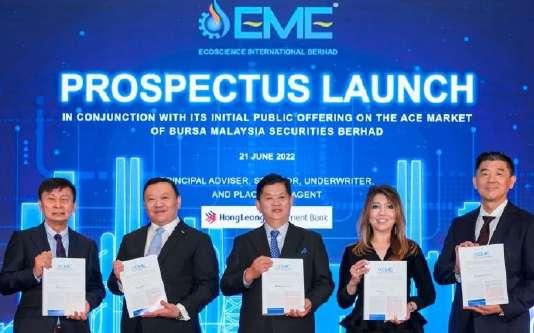
Group managing director Wong Choi Ong said that as a sup porting service provider to the palm oil industry, generally considered to be a resilient sector, Ecoscience has benefitted and grown over the past 18 years “The future of the industry continues to be positive based on the global consumption of crude palm oil (CPO) which grew at a compound annual growth rate (CAGR) of 2.5% between 2018 and 2020,” he said.
The company noted that proceeds from the IPO will be utilized to expand its palm oil operations abroad and scale up its energy efficiency business.
A total of RM5 million, or 20% of the IPO proceeds, will be allocated for the incorporation of a wholly-owned subsidiary in Indonesia and the establishment of a new fabrication facility and office located at Balikpapan in East Kalimantan province.
“The said expansion will hasten market response time and re duce our shipping costs. The fabrication facility will enhance the group’s prospects of securing new contracts for the expansion or development of palm oil plants and facilities or other related sectors there,” explained Wong. The company intends to recommend the distribution of at least 20% of its net earnings as dividends to shareholders.
Palm Oil Today Indonesia October - December 2022 www.indopalmoil.com 18 WORLD NEWS PENYEDIA LAYANAN
PALM OIL SUPPORT SERVICE PROVIDER ECOSCIENCE WILL RAISE CLOSE TO RM24 MIL IN ITS IPO
CAN REGENERATIVE AGRICULTURE REDUCE THE ENVIRONMENTAL HARM OF PALM OIL PRODUCTION?




A new kind of agriculture that addresses the double-edge sword of soil degradation and climate change could replace chemically-intensive monoculture oil palm plantations. But can independent smallholder farmers be convinced to adopt regenerative techniques at scale? A coalition of actors including Danone, L’Oréal, Mars, Musim Mas and SNV is exploring the concept in North Sumatra
Palm oil plantations cover 27 million hectares of the Earth’s surface. Production of the world’s most widely used vege table oil tends to evoke images of endless rows of oil palm trees stretching uninterruptedly across the horizon, of lost for ests and hungry orangutans roaming scorched peatlands. But there are pockets of the industry who believe oil palm can be grown in harmony with, and not in place of, tropical ecosystems.
The monoculture plantations that have rapidly spread across Indonesia and Malaysia since the late 1990s could make way for a new way of cultivating oil palm that restores degraded soil, protects biodiversity, and avoids harmful pesticides and fertilisers.
The practice, known as regenerative agriculture, is not entirely new. Indigenous peoples have been farming in balance with nature for thousands of years. But it is an increasingly popular topic in food industry circles as pressure builds on the sector to revive dying soils and curb the industry’s climate impact.
Agriculture accounts for up to 29 per cent of total greenhouse gas emissions, and the United Nations estimates that a quarter of the Earth’s surface land that could feed 1.5 billion people has become degraded, and 24 billion tonnes of fertile topsoil are lost to erosion and deforestation every year.







The palm oil trade faces parallel challenges. Studies have found that the conversion of peat swamps into palm oil planta tions has added one per cent to total global emissions, while a 2°C increase in global temperature could lead to a 30 per cent drop in oil palm yields which are already under pressure to pests, disease and productivity-sapping farming techniques.
OLD IS NEW: A BETTER WAY TO RESTORE SOIL HEALTH


To address the double-edged sword of climate change and soil degradation in the oil palm sector, a coalition of actors known as The Livelihoods Funds is implementing a large-scale regenerative agriculture project in Labuhan Batu, North Sumatra, Indonesia.
The project, which is backed by consumer goods firms Danone, Mars, L’Oréal, palm oil company Musim Mas, and implemented by sustainability non-profit SNV, aims to build a deforestation-free supply chain, regenerate degraded land, protect local biodiversity, and improve the socioeconomic welfare of independent palm oil smallholder farmers in the area.

Palm Oil Today Indonesia October - December 2022
19COVER STORY
www.kemenangan.co.id info@kemenangan.co.id ptkemenangan ptkemenangan(021) 4207083, 4241371 is a manufacturing company established since 1954. A QUALITY YOU CAN TRUST We produce high quality Light Buoys and Mooring Buoys made of PolyEthylene and Steel, Rub Strips, Rubber Fenders, Tug Boat Fenders, Rubber Hose, PE Boat and PE Floats. We also sell, repair, and rent out Pneumatic Fenders. We have SNI, ISO and OHSAS certifications. We are member of IALA and PIANC. Our products have been used by Chevron, Shell, Pertamina, Mubadala, Kangean, Exxon, Pelindo and more. Our products have been exported to Singapore, Canada, Australia, Qatar, etc.
The Labuhan Batu project will train smallholders in regenerative agriculture techniques and help them get access to finance to replant their old palm trees and grow a variety of crops to diversify their income. Independent smallholder oil palm farmers that is, smallholders not affiliated to any particular company or mill account for about a quarter of the total planted oil palm area in Indonesia. Musim Mas’ general manager of programmes and projects Rob Nicholls points out that smallholders face a number of challenges, including poor palm fruit productivity smallholder productivity rates are as much as 45 per cent lower than company production levels because of a lack of good quality seedlings and the resources to farm sustainably. Independent smallholders are often blamed for the slash-and-burn agriculture that has blighted the sector. “Regenerative agricultural practices may potentially help them improve yields and sustainability, which could open the doors for them to more markets,” Nicholls says.
The Livelihoods Funds project will work with social foresters to protect and restore standing forests, which would otherwise be prone to illegal palm oil encroachment, logging and poaching. In addition, patrols will be deployed to protect the forest.
DOES NATURE-FRIENDLY FARMING REALLY IMPROVE YIELD?
It is too early to say whether the regenerative approach will deliver a higher yield, but a new approach is worth trying. Most of the independent smallholders in the area have ageing palm oil plots near the end of their productive lives and have stopped using fertiliser because they can no longer afford it, or lack the knowledge of how to use it. “A cost-efficient way to increase yield is the number one motivation [among farmers] for regenerative agriculture,” says de Royer. If every method is applied in the right way by the farmers enrolled in the programme, de Royer says he expects to see yield at least maintained and income sources progressively diversified.
Other attempts at using regenerative farming methods point to a productivity pay-off. A project that started in 2008 involving 18 small-scale farms over 60 hectares of the Brazilian Amazon has not only locked in more soil carbon and supports more wildlife than monocropped farms, but has produced 40 kilograms more fruit per palm tree. A regenerative palm project in West Africa that has been running since 2007 is reportedly 20 per cent more productive than traditional plantations.
The project in Labuhan Batu aims to regenerate 8,000 hectares of degraded land that had been intensively farmed monoculture oil palm plantations for the past 30 years, and protect 4,000 hectares of forest. Some 2,500 smallholders will be provided with seedlings, compost and training.
Regenerative farming trumps conventional cultivation in a number of important ways. Conventional palm oil plots leave most of the soil uncovered during the growing season, exposing it to the elements. But on a restorative plot, a mixture of cover crops, such as watermelon, shallot, tomato, and chili, are intermingled with palm trees. The vegetable crops do not compete with palm for nutrients, water, or sunlight, and the greater diversity of plants keeps the soil balanced and healthy.
Instead of chemical fertilisers, the cost of which has increased by 30 per cent since the start of the year, organic compost is used to enrich the soil, restore soil biodiversity and biomass from harvests laid over the soil to keep it moist and protect it from heat and drought a process known as mulching.
Pests are a big problem for palm oil farmers. But rather than lay traps or use poison, nests are built to accommodate rodent eating Barn owls and pheromone traps used to control insects instead of toxic insecticides.
WEEDING OUT DEFORESTATION
The Livelihoods Funds project is recruiting “champion farmers” to spread the word of good regenerative practices and help phase-out old, destructive methods to help curtail deforestation.
Adjacent to the project area is 100,000 hectares of rainforest. Providing farmers with a sustainable livelihood removes the incentive to cut trees. “If companies really want to source 100 per cent zero-deforestation palm oil, they have no choice but to tackle issues at the broader landscape level,” says Sébastien de Royer, senior project manager of Livelihoods Venture in Indonesia.
Another strategy for curbing deforestation is to engage social forestry groups operating in the buffer zone of the supply-shed. They can help restore degraded areas by introducing new types of agroforestry while preserving the remaining forest, says de Royer.
Monique van Wijnbergen is sustainability and corporate communication director for Rotterdam-headquartered Natural Habitats, which works with smallholders in Ecuador to produce regeneratively grown oil palm on “patchwork plantations” mixed with vegetable crops and livestock. She says the productivity of these farms is no match for the huge industrial plantations that span Southeast Asia, which enjoy economies of scale.
Research from the World Agroforestry Centre, a research centre, has shown that while the yield on mixed-use farms increases per palm, it does not necessarily increase per hectare. Palm oil trees on conventional monocrop farms tend to be more densely grown. However, as mixed-use farms give farmers income diversity, they are more shielded from oil palm price volatility.
CAN REGENERATIVE AGRICULTURE SCALE?
The big question is whether regenerative agriculture can scale. It is more labour intensive than conventional cultivation and the agroforestry projects in Africa and Brazil are too small to serve as a template that can be scaled and applied elsewhere. The Livelihoods Funds project’s aimed recruitment of 2,500 smallholders is a fraction of the 1 million or so independent smallholders in Indonesia.
Scale hinges not only on the quality of execution but on finance. While the consumer good firms involved in the Livelihoods Funds projects have agreed to buy the regeneratively grown oil palm which is significantly more expensive than regular oil the small holders first need funding to replant their ageing palm trees and set up the regenerative agricultural system.
But most banks won’t give loans to smallholders, because palm trees are only productive three to four years after they’re planted. “The risk for traditional banks is considered too high,” says de Royer, who is in discussions with impact investors and Indonesian banks to secure financing for the smallholders in the coming years.

Palm Oil Today Indonesia October - December 2022 www.indopalmoil.com 20 COVER STORY





www.nst-intl.com LEADING INNOVATION CRUSHING EXTRACTIONS Nee Soon Teknik Sdn Bhd was established in 1980 started the business in coconut oil industry and later extend to palm oil/ palm kernel oil industry. Nee Soon Teknik (NST) is a specialist in the engineering, procurement, construction, and commissioning (EPCC) of Kernel Crushing Plants (KCP) through out South East Asia, primarily in Malaysia and Indonesia. NST is also a manufacturer of equipment and spare parts for Palm Kernel Crushing Plants (KCP) and Palm Oil Mills (POM) as well. CONTACT US COMPANY BACKGROUND Email:Telephone: +606 952 2364/ +606 951 6298 Fax: +606 951 6549 info@neesoonteknik.com.my Lot 2977, Batu 3 1/2, Jalan Salleh, 84000, Muar, Johor Darul Takzim, Malaysia.Address:
A BAGAIMANA AFRIKA MENANGGUNG BEBAN BADAI SEMPURNA MINYAK KELAPA SAWIT
BIDJAN – Warung kue kacang goreng Djeneba Belem di Abidjan berada jauh dari perang yang berkecamuk di Ukraina. Tetapi kini usahanya berada dalam konsekuensi yang tidak terduga: harga minyak kelapa sawit yang melonjak. “Saya bahkan tidak ingin menjual ini lagi karena saya pikir, jika harga minyak telah naik sebanyak itu, apa yang akan saya dapatkan?” Katanya sambil mengaduk setumpuk kue di warung pinggir jalan di ibu kota komersial di tepi laguna Pantai Gading.
Baik Rusia maupun Ukraina tidak memproduksi minyak kelapa sawit, sebuah komoditas tropis, tetapi invasi Moskow telah memicu efek tidak terduga di seluruh perekonomian global yang saling terhubung secara rumit saat ini.
Konflik tersebut membantu mendorong harga minyak kelapa sawit di mana-mana dari hidangan Afrika, nasi jollof dari Nigeria, hingga pisang raja ketan Pantai Gading ke harga tertinggi yang menurut para ahli akan memperdalam krisis biaya pangan dan menghukum masyarakat yang termiskin.

Pergolakan itu mendorong eksportir utama minyak kelapa sawit, Indonesia untuk memberlakukan larangan ekspor dalam waktu dekat, sebagai upaya untuk menahan kenaikan harga dalam negeri. Kata seorang pejabat pada hari Selasa kalau larangan tersebut mungkin dapat diperluas. “Kami belum pernah benar-benar teruji dalam situasi seperti ini,” kata James Fry, pendiri konsultan komoditas pertanian LMC International. “Ini akan menjadi beban terberat bagi negara-negara miskin atau negara-negara di Afrika.” Dan benar, di sub-Sahara Afrika, biaya pangan telah mencapai 40% dari pengeluaran rumah tangga, proporsi tertinggi dari wilayah manapun di dunia, dan lebih dari dua kali lipat pengeluaran untuk makanan di negara maju sebesar 17%.Dan ketika harga meningkat dengan cepat secara keseluruhan, termasuk bahan bakar, dan berjuta-juta masyarakat Afrika yang telah terjerumus ke dalam kemiskinan ekstrem akibat pandemi, lonjakan harga minyak kelapa sawit akan membantu memaksa banyak orang untuk membuat pilihan sulit.
Lucy Kamanja, seorang konsultan industri kecantikan di ibu kota Kenya, Nairobi, mengatakan bahwa peningkatan 90% minyak goreng berbasis minyak kelapa sawit berarti dia harus mengurangi buah dan kebutuhan rumah tangga.
‘LOMPATAN RAKSASA’ DALAM HARGA PANGAN
Bahkan sebelum pecahnya pertempuran di Ukraina, inflasi telah menjadi perhatian global. Harga komoditas pangan telah meningkat 23% tahun lalu, laju tercepat dalam lebih dari satu dekade, menurut Organisasi Pangan dan Pertanian Global (Food and Agriculture Organization / FAO).
Pada bulan Maret, indeks harga FAO untuk daging, susu, sereal, gula dan minyak telah mencapat tingkat tertinggi sejak dimulainya pada tahun 1990, setelah “lompatan raksasa” 12,6% dari bulan Februari. Minyak goreng merupakan salah satu produk yang paling terpukul.
Kekeringan menghancurkan ekspor minyak kedelai dari Argentina dan produksi minyak rapa di Kanada. Kondisi cuaca yang buruk di Indonesia dan larangan imigrasi terkait COVID di Malaysia menghambat produksi minyak kelapa sawit dan men gakibatkan kekurangan tenaga kerja di perkebunan. “Satu-satunya titik terang, di satu sisi, adalah bunga matahari,” kata Fry dari LMC.
Kemudian Rusia mengirim pasukannya ke Ukraina pada bulan Februari, mengganggu pengapalan dari wilayah Laut Hitam, yang menyumbang 60% produksi bunga matahari dan tiga perempat ekspor, serta menghapus sebagian besar pasokan global.
Jika itu tidak cukup, harga minyak mentah yang tinggi kon sekuensi lain dari perang telah menambah tekanan lebih lanjut pada pasokan minyak nabati dengan meningkatkan permintaan bahan bakar nabati. “Anda hampir tidak bisa menebus betapa buruknya itu,” tambah Fry. “Kami benar-benar mengalami badai yang hampir sempurna.”
Pada tanggal 9 Maret, sekitar dua minggu setelah invasi Rusia, kontrak minyak kelapa sawit mentah Malaysia yang menjadi patokan global mencapai rekor 7.268 Ringgit ($1.718) per ton, hampir dua kali lipat harga tahun sebelumnya. Kontrak tersebut, yang melonjak lebih dari 9% pada hari Rabu, kini telah meningkat mendekati 50% tahun ini.
MENDAPATKAN KEUNTUNGAN
Selain tradisi kuliner, pilihan minyak kelapa sawit juga telah menjadi pilihan ekonomi bagi beberapa negara miskin, mengingat secara historis merupakan minyak nabati utama yang paling murah. Akhir-akhir ini, data Bank Dunia menungjukkan bahwa mereka telah mengejar saingannya, terutama di minyak kedelai dan bunga matahari.
Pada bulan Maret, untuk pertama kalinya, ia untuk sementara menjadi minyak makan yang paling mahal di antara empat minyak nabati utama di India, dianggap sebagai penentu harga global, menandakan bahwa hari-hari di mana harga minyak di Afrika merupakan yang paling murah mungkin saja sudah berakhir.
Sementara hal ini menegangkan saraf dan anggaran jutaan orang di Afrika, seperti Kamanja di Nairobi dan Belem di Abidjan, ia juga menghadirkan peluang di benua itu. Hampir dua lusin negara Afrika menanam kelapa sawit di lahan sebesar hampir 6 juta hektar, dan sektor tersebut merupakan pemberi kerja utama dalam sektor pertanian bagi pekerja yang dapat melihat pendapatan mereka meningkat.
Palm Oil Today Indonesia October - December 2022 www.indopalmoil.com 22 SPECIAL REPORT : AFRICA
Persiapan kue kacang Afrika Preparation of African bean cakes
Sylvain N’Cho menjalankan pabrik minyak kelapa sawit yang jaraknya satu jam di sebelah Timur Abidjan dan diestimasikan bahwa pendapatannya mencapai kenaikan 20% selam setahun terakhir. “Bukan hanya kami yang diuntungkan dengan kenaikan harga minyak kelapa sawit. Sebagian itu masuk ke para petani,” katanya seiring alat berat memuat tandan buah kelapa sawit merah ke konveyor sabuk.
Jerome Kanga, yang bercocok tanam di lahan sekitar dua hektar di dekat kota Adiake, Pantai Gading, mengatakan bahwa dia kecewa dengan harga yang dia dapatkan ketika dia mulai berproduksi tiga tahun lalu. “Tetapi sejak bulan Desember, dan khususnya di bulan Februari dan Maret, sudah menjadi lebih menarik. Kira-kira ada kenaikan sebesar 20%,” katanya.
Namun jumlah orang yang berhasil masih lebih sedikit dibandingkan dengan yang masih tertekan. Afrika mengonsumsi lebih banyak minyak kelapa sawit daripada yang dia hasilkan dalam pasar global yang didominasi oleh Asia Tenggara. Bahkan di Pantai Gading, salah satu dari segelintir eksportir minyak kelapa sawit, N’Cho mengakui bahwa konsumen dirugikan. “Jika ada kenaikan di sana, maka secara sistematis harga di pasar domestik juga ikut naik,” katanya.
Negara-negara Afrika mengimpor hampir 8 juta ton minyak kelapa sawit pada tahun 2020, menurut FAO, dari data tahun lalu yang tersedia. Nigeria, importir terbesar benua tersebut, mengirimkan lebih dari 1,2 juta ton minyak kelapa sawit. Kenya membeli hampir senilai $830 juta.
HOW AFRICA IS BEARING THE BRUNT OF PALM OIL’S PERFECT STORM

ABIDJAN - Djeneba Belem’s fried bean cake stall in Abidjan is a world away from the war raging in Ukraine. But her business is now at the mercy of an unexpected consequence runaway palm oil prices. “I didn’t even want to sell anymore because I thought, if the price of oil had gone up that much, what am I going to earn?” she said as she stirred a batch of cakes at her street-side stall in Ivory Coast’s lagoon-side commercial capital.
Neither Russia nor Ukraine produces palm oil, a tropical commodity, but Moscow’s invasion has triggered knock-on effects across today’s intricately interconnected global economy.
The conflict has helped propel prices for palm oil ubiquitous in African dishes from Nigerian jollof rice to Ivorian sticky alloco plantains to record highs that experts say will deepen a food-cost crisis and punish the poorest.
The upheaval pushed top palm oil exporter Indonesia to ban some exports in recent days, in a effort to keep a lid on domestic prices. A senior government official said on Tuesday that the ban could be widened. “We’ve never really tested this kind of situation,” said James Fry, founder of agricultural commodities consultancy LMC International. “It will be the poorest in big countries or countries in Africa who will almost certainly have to bear the brunt.” Indeed in sub-Saharan Africa, food expenses already account for 40% of households’ consumer spending, the highest proportion of any region in the world, and more than double the 17% spent on food in advanced economies. And as prices rise rapidly across the board, including fuel, and tens of millions of Africans already pushed into extreme poverty by the pandemic, spiking palm oil prices will help force many to make tough choices.
Lucy Kamanja, a beauty industry consultant in Kenya’s capital Nairobi, said a 90% increase in palm-based cooking oil means she’s had to cut down on fruit and household essentials.
‘GIANT LEAP’ IN FOOD PRICES
Even before the outbreak of fighting in Ukraine, inflation had become a global concern. Food commodity prices climbed over 23% last year, the fastest pace in more than a decade, according the United Nations Food and Agriculture Organization (FAO).
In March the FAO’s global price index for meat, dairy, cereals, sugar and oils hit its highest level since its inception in 1990, af ter a 12.6% “giant leap” from February. Cooking oils have been among the products hardest hit.
Drought decimated soy oil exports from Argentina and rape seed production in Canada. Poor weather in Indonesia and COVID-related immigration restrictions in Malaysia throttled palm oil output and caused labour shortages on plantations. “The only bright spot, in a way, was sunflower,” said LMC’s Fry.
Then Russia sent its military into Ukraine in February, dis rupting shipments from the Black Sea region, which accounts for 60% of sunflower production and over three-quarters of exports, and wiping out a huge share of global supply.
If that wasn’t enough, high crude oil prices another conse quence of the war have added further pressure to vegetable oil supplies by increasing demand for biofuels. “You almost couldn’t make it up how bad it’s been,” Fry added. “We have had really almost a perfect storm.”
On March 9, about two weeks after Russia’s invasion, the Ma laysian crude palm oil contract that serves as the global bench mark topped out at a record 7,268 ringgit ($1,718) per tonne, nearly double the price a year earlier. The contract, which jumped more than 9% on Wednesday, has now risen by close to 50% this year.
www.indopalmoil.com Palm Oil Today Indonesia October - December 2022
SEMUA MENGELUH
23SPECIAL REPORT : AFRICA
Culinary tradition aside, the choice of palm oil has also been an economic one for many poor countries, given it has historically been the cheapest of the major vegetable oils. Lately, however, World Bank data show it’s been catching up to rivals, particularly soy and sunflower oil.
In March, for the first time, it temporarily became the costliest among the four major edible oils in India, considered a global price bellwether, signalling that the days when Africa’s go-to oil was reliably the cheapest could be over.
While this is straining the nerves and budgets of millions of Africans, like Kamanja in Nairobi and Belem in Abidjan, it is also presenting some opportunities on the continent. Nearly two dozen African countries grow oil palm on almost 6 million hectares of land, and the sector is a major agricultural sector employer of workers who stand to see their incomes rise.
Sylvain N’Cho runs an oil palm mill an hour east of Abidjan and estimates his revenues are up around 20% over the past year. “We’re not the only ones reaping the benefit of the increase in palm oil prices. Part of it goes to the farmers,” he said as heavy machines loaded bunches of red palm fruit onto a conveyor belt.
Jerome Kanga, who farms two hectares near the Ivorian town of Adiake, said he was disappointed by the prices he was getting when he started producing three years ago. “But since December, and especially in February and March, it’s been more interesting. There’s been roughly a 20% increase,” he said.
Yet the number of people getting ahead is dwarfed by those feeling the squeeze. Africa consumes significantly more palm oil than it produces in a global market dominated by Southeast Asia. Even in Ivory Coast, one of just a handful of net palm exporters, N’Cho conceded that consumers are in for pain. “If there is an increase over there, there’s systematically an increase on the local market,” he said.
African nations imported nearly 8 million tonnes of palm oil in 2020, according to the FAO, the latest year for which data is available. Nigeria, the continent’s biggest importer, shipped in over 1.2 million tonnes of palm oil. Kenya brought in nearly $830 million worth.
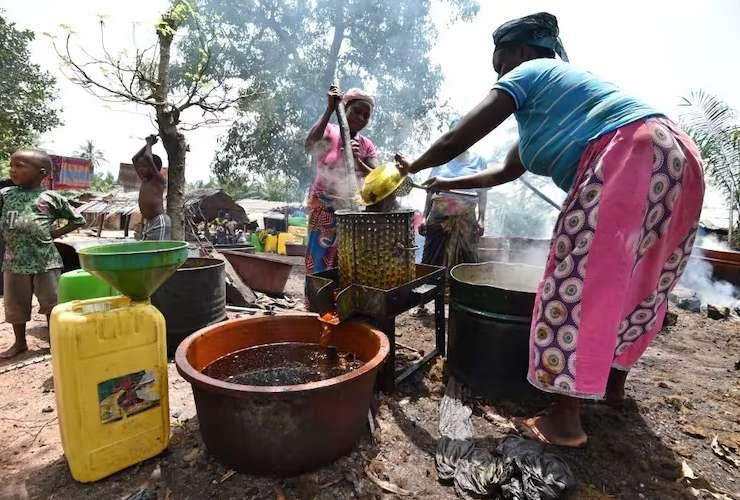

Palm Oil Today Indonesia October - December 2022 www.indopalmoil.com 24 SPECIAL REPORT : AFRICA
REAPING THE BENEFIT
‘EVERYONE IS COMPLAINING’



















OCTOBER 20234-6 SANTIKA PREMIERE DYANDRA HOTEL & CONVENTION MEDAN - INDONESIA THE13TH EDITION OF 2023 Brought To You By :Endorsed and Suppor ted By : INDUSTRY NETWORKING LUNCH Technology Seminars International Conference THE WORLD'S LARGEST PALM OIL EVENT AT THE HEART OF THE INDUSTRY! highlights of the event www.palmoilexpo.com 9 th INDONESIA INTERNATIONAL PALM OIL CONFERENCE 2023 Incorporating : +62 21 5088 2917 info@fireworksid.com
KEKUATAN MINYAK KELAPA SAWIT BERKELANJUTAN MALAYSIA SERING DIABAIKAN
Aenteri Industri Pertanian dan Komoditas Datuk Zuraida mengatakan bahwa meskipun ada beberapa peningkatan kesadaran Uni Eropa (UE) terhadap minyak kelapa sawit berkelanjutan dan Minyak Kelapa Sawit Berkelanjutan Malaysia (Malaysian Sustainable Palm Oil / MSPO), masih belum ada pemahaman yang cukup tentang metrik atau nilainya ataupun keberhasilannya.

Menurut Dewan Minyak Kelapa Sawit Malaysia (Malaysian Palm Oil Board / MPOB), 3.040 perkebunan atau 96,04 persen terdiri dari 4.640.895 hektar tertanam yang telah memperoleh sertifikasi MSPO per 30 Juni 2020, sementara itu ada 400 kilang minyak atau 88,5 persen yang telah bersertifikasi MSPO. “Kekuatan standar MSPO sering diabaikan mengingat favoritisme blok ekonomi terhadap sertifikasi Minyak Kelapa Sawit Berkelanjutan Meja Bundar (Roundtable on Sustainable Palm Oil / RSPO), katanya pada hari Sabtu (4 Juni) dalam sebuah artikel berjudul : MSPO usaha Pemerintah dalam memastikan keberlanjutan industri minyak kelapa sawit.
Standar MSPO diselaraskan dengan pengelolaan produksi minyak kelapa sawit dengan banyak undang-undang dan peraturan nasional yang ada. Dalam konteks keberlanjutan minyak kelapa sawit, skema yang mirip telah diimplementasikan seperti RSPO dan Minyak Kelapa Sawit Berkelanjutan Indonesia (Indonesia Sustainable Palm Oil / ISPO).
Singkatnya, sertifikasi MSPO menekankan manajemen yang kredibel berkelanjutan dan bertanggung jawab untuk membawa dampak sosial, lingkungan dan ekonomi yang positif sambil meminimalkan dampak negatif, terutama pada manusia dan lingkungan, tambahnya.
RSPO
RSPO dikembangkan oleh tim internasional yang terdiri dari produsen minyak kelapa sawit, pedagang, investor dan organisasi nirlaba pada tahun 2004, kurang lebih satu dekade sebelum MSPO. RSPO adalah kelompok dengan berbagai pemangku kepentingan, kelompok nirlaba yang mempersatukan tujuh sektor industri minyak kelapa sawit dalam dialog reguler, termasuk investor, petani, pedagang dan Lembaga Swadaya Masyarakat (LSM) menggunakan sistem pemungutan suara konsensus untuk mengembangkan standar dan kriteria pada proses berkelanjutan. Saat ini, 20 persen minyak kelapa sawit di dunia bersertifikasi RSPO.
Sebagai perintis sertifikasi , RSPO telah dipuji karena men dorong pertumbuhan dan menggunakan minyak kelapa sawit berkelanjutan. Tidak diragukan, ketika ditanam secara bertanggung jawab, kelap sawit sangat efisien dalam penggunaan lahan.
Dari beberapa hasil panen utama (kelapa sawit, kedelai, bunga matahari dan kanola), kelapa sawit menempati lahan yang paling sedikit tetapi menghasilkan minyak paling banyak. Satu ekar (0,40 hektar) kelapa sawit memproduksi 11 kali lebih banyak minyak dibandingkan kacang kedelai dan 10 kali lebih banyak daripada bunga matahari.
Namun belakangan ini, RSPO telah dikritik, terutama oleh organisasi nirlaba karena merasa standarnya gagal memberikan perlindungan yang memadai bagi hutan asli ataupun tenaga kerja minyak kelapa sawit maupun perlindungan iklim. Dalam artikelnya, Zuraida mengutip pendiri Grassroots, Andrew Ng, yang menga takan: “Konflik hak asasi manusia dan hutan yang baru dan yang sudah ada terkait dengan pemegang sertifikar RSPO menunjukkan bahwa terlepas dari upaya Komite Tetap Jaminan RSPO, klaim minyak kelapa sawit berkelanjutan masih tidak bisa diandalkan.” Di antara RSPO, ada hampir 5.000 anggotanya merupakan perusahaan multinasional terbesar di dunia, seperti Unilever, Procter & Gamble, Kellogg’s dan Johnson & Johnson.
RUANG UNTUK PERBAIKAN
Jelas bahwa masih ada ruang untuk bertumbuh bagi skema sertifikasi seperti RSPO dalam upaya untuk menanamkan kepercayaan pada klaim mereka, menurut Badan Investigasi Lingkungan Inggris, katanya.
Melihat Inggris dan Uni Eropa segera memperkenalakan undang-undang baru untuk mengatasi ilegalitas, hak atas tanah dan deforestasi dalam rantai pasokan, hal ini telah menjadi semakin jelas.
Faktanya, sebuah laporan yang diadopsi oleh Parlemen UE telah menyoroti bahwa skema sertifikasi hanya dapat saling melengkapi dan tidak pernah dapat menggantikan uji tuntas oleh perusahaan karena kekhawatiran bahwa skeman sertifikasi saja tidak efektif, tambahnya.
www.indopalmoil.com
26 SUSTAINABILITY NEWS
MALAYSIAN SUSTAINABLE PALM OIL STRENGTHS OFTEN OVERLOOKED

Plantation Industries and Commodities Minister Datuk Zuraida Kamaruddin said that although there has been some increase in the European Union’s (EU) awareness of sustainable palm oil and the Malaysian Sustainable Palm Oil (MSPO), there is still not enough understanding of the metrics or of its successes.
According to the Malaysian Palm Oil Board (MPOB), 3,040 estates or 96.04 per cent comprising 4,064,895 hectares (ha) of planted land had obtained MSPO certification as of June 30, 2020, while as many as 400 oil mills or 88.5 per cent have been MSPO certified. “The strengths of the MSPO standard are often overlooked in view of the economic block’s favoritism towards the Roundtable on Sustainable Palm Oil (RSPO) certification, she said on Saturday (June 4) in an article entitled: MSPO: Government’s effort in ensuring the sustainability of the palm oil industry.
The MSPO standard is aligned to the management of palm oil production with many existing national laws and regulations. In the context of palm oil sustainability, similar schemes have been implemented such as the RSPO and the Indonesia Sustainable Palm Oil (ISPO).
In a nutshell, the MSPO certification emphasizes credibly sustainable and responsible management to bring about positive social, environmental, and economic impacts while minimizing the negative impacts, particularly on people and the environment, she added.
In recent times, however, the RSPO has also been criticized, especially by environmental non-profit organizations who feel that its standards failed to accord sufficient protection for pristine forests or palm oil laborers nor address climate protection. In the article, Zuraida quoted Grassroots founder, Andrew Ng, who said: “New and existing human rights and forest-linked conflicts associated with RSPO certificate holders show that despite the efforts of the RSPO Assurance Standing Committee (ASC), the sustainable palm oil claim is still unreliable.” Among RSPO’s nearly 5,000 members are some of the world’s biggest multinationals, such as Unilever, Procter & Gamble, Kellogg’s and Johnson & Johnson.
The RSPO was developed by an international team of palm oil producers, traders, investors and non-profit organizations in 2004, slightly more than a decade prior to the MSPO. The RSPO is a multistakeholder, non-profit group that unites seven sectors of the palm oil industry in regular dialogue, including investors, growers, retailers and non-governmental organizations (NGOs) using a consensus voting system to develop standards and criteria on an ongoing basis. Currently, 20 per cent of palm oil worldwide is RSPO-certified.
As a pioneering certification, RSPO has been praised for promoting the growth and use of sustainable palm oil. Doubtlessly, when grown responsibly, palm oil is incredibly land efficient.

Of the major crops (oil palm, soybean sunflower and canola), oil palm occupies the least land but produces the most oil. A single acre (0.40 hectare) of oil palm produces 11 times more oil than soybeans and 10 times more than sunflower.
ROOM FOR IMPROVEMENT
It is clear that there is room for improvement for certification schemes such as the RSPO in the quest to instill confidence in their claims, according to Environmental Investigation Agency UK, she said.
With both the United Kingdom and EU set to introduce new laws to address illegalities, land rights and deforestation in sup ply chains, this has become even more apparent.
In fact, a report adopted by the EU Parliament has highlight ed that certification schemes can only be complementary and can never replace due diligence by companies due to concerns that certification schemes alone are not effective, she added.
www.indopalmoil.com Palm Oil Today Indonesia October - December 2022
27SUSTAINABILITY NEWS
RSPO
An Interview with the Director of Sustainability, Olivier Tichit



Olivier Tichit is the Director of Sustainability of Musim Mas Group, based in Medan (Indonesia). Musim Mas is a major integrated palm oil company and a leader in sustainability Olivier oversees the implementation and execution of Musim Mas’ sustainability plan. His role includes reviewing the Group’s sustainability policy and strategy, as well as working with the Group’s key customers to identify synergies for enhancing palm oil’s sustainability proposition in the world commodity sector.
Musim Mas is an active member of the Roundtable for Sustainable Palm Oil (RSPO), where Olivier ser ves as an alternate member of the B oard of Governors, and as co-chair of the Standing Committee for Standards. Olivier is a member of the High Carbon Stock Approach Executive Committee, where he ser ves as Treasurer He is also a member of the Board of the Indonesian Palm Oil Producers Association.

A tropical agronomist by training, Olivier has worked in South-East Asia for the past twenty years. Olivier was formerly the Commercial and Sustainability Director of the Indonesian subsidiaries of SIPEF, a Belgian plantations group. Before joining SIPEF, Olivier was the Indonesia Countr y Manager for a major commodities merchant group, Ecom Agroindustrial, and
Olivier is active in the Roundtable on Sustainable Palm Oil (RSPO), the High Carbon Stock Approach (HCSA), and the





 Regenerative Agriculture Practices in Preventing Deforestation and Land Conversion in Indonesia
Regenerative Agriculture Practices in Preventing Deforestation and Land Conversion in Indonesia
28 IN THE HOT SEAT
1. Present in 13 countries, Musim Mas is one of the largest integrated palm oil corporations. Do share with us Musim Mas’ background and history.
In 1932, we began in Medan, Indonesia as the Nam Cheong Soap Factory where we manufactured and distributed quality soap products to local and international markets. Our humble beginning is a testimonial to the hard work that has borne fruit through the decades by our dedicated workforce. We have always taken pride in our values of hard work, determination, and persistence to make anything possible. A simple bar of soap has led us to the global position we hold today.
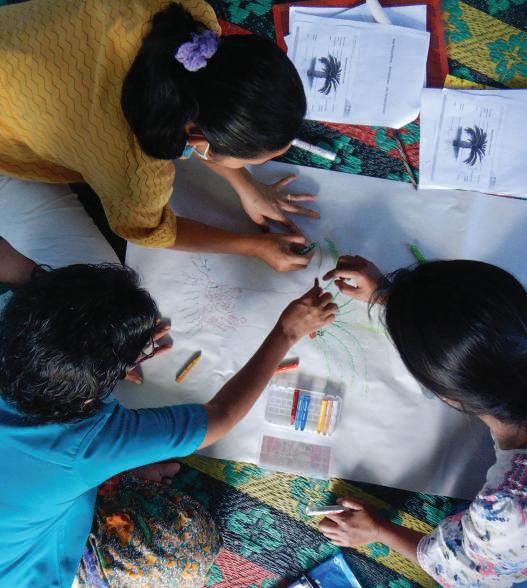
We made our foray into the palm oil industry with investments palm oil mills in this era.

One of our proudest moments came in 2004 when PT Musim of the Roundtable on Sustainable Palm Oil (RSPO). Musim Mas While we capitalized on the growing Asian market, Musim Mas began to establish operations around the world including our business spread to India, China, Vietnam, the Netherlands, Spain, Italy, and Brazil. Today, Musim Mas is Indonesia’s largest palm oil exporter to customers located all around the world.
Best Management Practices (BMP) -Regenerative Agriculture Training for Independent Smallholders.


We are ver y proud of our focus on sustainability with recognitions from around the world: Musim Mas Group became
company to receive the Indonesian Sustainable Palm Oil (ISPO) Southeast Asia to attain Palm Oil Innovation Group (POIG)









www.indopalmoil.com
Aims to Encourage the Adoption of Sustainable Palm Oil Agroforestry Practices in North Sumatra.
29IN THE HOT SEAT
2. With sustainability as the core value, br explain how Musim Mas integrates sustainability into its r ng and manufacturing.

We are a fully integrated company with operations upstream and downstream. We are ver y fortunate that our Chairman was very involved from the start, to the point that he went to the RSPO, and sat on the board, almost 20 years back. We have strong governance at the top management level that truly believes in become the norm within the sustainability of our operations and is embedded throughout our company.
What is interesting is that while we have the Sustainability department, each department (like the Operations Team,





are not just waiting for the Sustainability department/team to sustainability, which is ver y important since it gives a sense of is especially helpful as this means they can adapt and they can feedback to us on what works or what doesn’t work. It is an inclusive and integrated process as we can tell them about a new sustainability initiative, and their team can suggest what works better on the ground. At the end of the day, we want to make it practical for the teams on the ground to implement sustainability, and not something that will place more pressure on them.

www.indopalmoil.com
Estates Team, or Procurement Team) has its own sustainability
the Adoption of Sustainable Palm Oil Agroforestry Practices in North Sumatra.
Train-the-Trainer Program Covering Business and Institutional Capacity Development as well as Introduction to Agroforestry.
3. Do share with us Musim Mas’ project in regenerative agriculture with other big brands. What are the aims and goals of this project?
Musim Mas has recently embarked on an unprecedented, ten-year-long large-scale sustainable palm oil project with the to build a transparent and deforestation-free supply chain based on locally adapted agroforestr y models, regenerative agriculture,





possibly the entire palm oil industry. You can read more about L3F at this link here - https://livelihoods.eu/l3f/ crop yields and reduce total planted area. It will study the u se of farmer resilience and autonomy, including diversifying crops through intercropping and agroforestry, improving soil fertility and regenerating soil health, developing integrated and biological pest control, and enhancing biodiversity.
In terms of aims, we hope to help 2,500 smallholder palm oil smallholders achieve sustainable livelihoods in North Sumatra, Indonesia, regenerate 8,000 hectares of palm farms in degraded land areas, while restoring an additional 3,500 hectares of local biodiversity over ten years. We strive to scale our learnings and
are long-time Musim Mas partners and L3F investors. Musim Mas will implement the program locally with SNV, an NGO





extend Musim Mas’ current smallholder initiatives and leverage our activities on the ground.
4. How does this project intend to promote nonpalm agroforestry models? How does it serve as a buffer between palm farms and protected forests?
Rantau Prapat. As a new program, the exact details are being studied.
One of the components is Agroforestr y Demo Plot Development. As part of the implementation of the regenerative agriculture concept, the project will encourage and implement agroforestry models in smallholder plots. Four agroforestry models will be developed, i.e., palm oil agroforestry (PO AF) with annual crops, PO AF with perennial crops, PO AF with ‘sisipan’ species- an approach of planting in the spaces between the palms, and PO AF combined with silvopastoral models which are plant growth combined with livestock. SNV will develop demo plots for all types in every village, including the nurseries.
www.indopalmoil.com
the Adoption of Sustainable Palm Oil Agroforestry Practices in North Sumatra.
31IN THE HOT SEAT
5. In your view, how these collaborations can help independent smallholders’ lack of access to technical and operational knowledge, also ncial resources?
Musim Mas initiated one of the most comprehensive collaboration projects to improve independent smallholder sustainability. In 2015, we launched our smallholder program with the International Finance Corporation (IFC), local governments, and banks. Starting with smallholders engaged at our mills, we later extended it to smallholders around third

downstream players such as Danone, L’Oréal, and Mars



While many downstream companies are marketing sustainability, it has not percolated down to the producers. As a vertically integrated company, we hope to facilitate that collaboration to improve sustainability across the supply chain.
6. How do Musim Mas’ remote sensing capabilities come into the picture and assist in the land-use change, deforestation, and degradation of land?
Our Geographic Information System (GIS) team uses a combination of methods to monitor our operations and that of
they can go on to train wider groups of smallholders, a trainthe-trained approach. We collaborate on a landscape level at these hubs, with district governments, NGOs, growers, and mills. We have since launched 6 smallholder hubs.
Smallholders face a multitude of challenges. Many lack land deeds and hence are unable to secure loans to obtain fertilizer and other resources needed to improve yields. Consequently, many
be as much as 116% below company plantations in Indonesia. We take the view that collaborations are the way to help them gain legitimacy and resources and improve market access. Collaborations should involve local and district governments, downstream players. Among other projects with downstream
maps and information provided by these suppliers, relying on a service provider, Earthqualizer’s satellite monitor ing platform (previously Aidenvironment’s platform), and keeping track of supplier activity through public platforms such as GeoRSPO and the World Resources Institute’s Global Forest Watch (GFW).
We are also part of the RADD (Radar Alerts for Detecting Deforestation) system, a pilot multi-stakeholder platform with updated technical capabilities that allows us to detect tropical


monitor over six million hectares across Indonesia and Malaysia. We work with WRI’s pilot RADD system to work on the satellite
 Training Independent Smallholders on how to make compost
Training Independent Smallholders on how to make compost
32 IN THE HOT SEAT




PRESIDEN INDONESIA MENGKAJI PROGRES PENELITIAN MINYAK GORENG KELAPA SAWIT MERAH DI MEDAN
J
AKARTA - PresidentJoko Widodo (Jokowi) mengunjungi Pusat
Penelitian Kelapa Sawit (PPKS) di Medan, Sumatera Utara, untuk memantau progres penelitian menggunakan minyak kelapa sawit merah sebagai minyak goreng dalam sebuah kungjungan kerja ke provinsi tersebut.
Menurut keterangan yang diterima dari Biro Pers Sekretariat Presiden pada hari Kamis, Ketua PPKS Edwin Lubis mengatakan bahwa kelapa sawit merah, selaku inovasi produk minyak kelapa sawit, memiliki potensi untuk membantu mengurangi prevalensi gagal tumbuh di masyarakat. “Minyak goreng kelapa sawit merah tidak hanya bisa (digunakan) untuk menggoreng (makanan), tetapi juga bisa menjadi suplemen untuk membantu warga mencegah kekerdilan karena nilai gizi pada minyak goreng (kelapa sawit) merah lebih banyak dibandingkan dengan minyak goreng lainnya yang dijual di pasar,” kata Lubis.
Minyak goreng kelapa sawit merah memiliki tingkat provitamin A dan E yang lebih tinggi dibanding produk minyak goreng lainnya, dan teknologi sederhana digunakan dalam proses produksi untuk mempertahankan nilai gizi minyak tersebut, ungkapnya. Kelebihan minyak goreng merah adalah minyaknya memiliki tingkat vitamin A dan E yang lebih tinggi karena proses produksi memprioritaskan (pengawetan) nutrisinya,” kata kepala pusat penelitian tersebut.
Minyak goreng kelapa sawit merah memiliki potensi untuk dikembangkan sebagai produk usaha mikro, kecil dan menengah (UMKM) karena investasi yang dibutuhkan lebih sedikit dibandingkan dengan pabrik minyak goreng komersial. “Kami juga berharap (produsen minyak goreng kelapa sawit merah) dapat dikembangkan di pedesaan untuk memastikan ia tetap terjangkau karena biaya logistik bisa dihilangkan sama sekali,” katanya.
Kemudian ia juga menyoroti perlunya mengedukasi warga tentang manfaat minyak goreng kelapa sawit merah dan mengurangi keragu-raguan masyarakat karena warna merah pada minyak goreng sangat tidak biasa.
Kepala pusat penelitian itu berharap semua pemangku kepentingan dapat membantu mempromosikan produk inovatif tersebut sebagai alternatif untuk menjamin supan gizin harian masyarakat. “Kami mengharapakan dukungan pemangku kepentingan dalam mempromosikan minyak goreng kelapa sawit merah,” tambah Lubis.
Menteri Pertanian Syahrul Yasin Limpo; Menteri Koperasi dan Usaha Kecil dan Menengah Teten Masduki; Menteri Pekerjaan Umum dan Perumahan Rakyat Basuki Hadimuljono; dan Gubernur Sumatera Utara Edy Rahmayadi mendapmpingi Presiden ke pusat penelitian.
INDONESIA’S PRESIDENT REVIEWS PROGRESS OF RED PALM COOKING OIL RESEARCH IN MEDAN
J
AKARTA - President Joko Widodo (Jokowi) visited the Palm Oil Research Center (PPKS) in Medan, North Sumatra, to monitor the progress of research on using red palm oil as cooking oil during a working visit to the province.


According to a statement received from the Presidential Secretariat Press Bureau here on Thursday, PPKS head Edwin Lubis said that red palm oil, as an innovation of palm oil products, had the potential to help reduce the prevalence of stunting among residents. “The red palm cooking oil can not only be (used) to fry (foods), but can also be a supplement to help residents prevent stunting growth because the nutritional value of red (palm) cooking oil is greater than other cooking oils sold in markets,” Lubis added.
Red palm cooking oil has a higher level of provitamins A and E compared to other cooking oil products, and simple technology is used in the production process to maintain the oil’s nutritional value, he informed. The advantage of the red cooking oil is that the oil has higher vitamin A and E levels because the production process prioritizes (the preservation of) nutrients,” the research center head explained.
Red palm cooking oil has the potential to be developed as a micro, small, and medium enterprises (MSMEs) product because the investment needed for the product is much less compared to commercial cooking oil factories. “We also hope (red palm cooking oil producers) can be developed in villages to ensure it remains affordable because the logistics expense can be made close to zero,” he said.
He then highlighted the need to educate residents about the benefits of red palm cooking oil and reduce public hesitancy due to the unusual red color of the cooking oil.
The research center head expressed the hope that all stakeholders would help promote the innovative product as an alternative to ensure residents’ daily nutritional intake. “We hope stakeholders’ support in promoting the red palm cooking oil,” Lubis added.
Minister of Agriculture Syahrul Yasin Limpo; Minister of Cooperatives and Small and Medium Enterprises Teten Masduki Minister of State Secretariat Pratikno; Minister of Public Works and Public Housing Basuki Hadimuljono; and North Sumatra Governor Edy Rahmayadi accompanied the President to the research center.
Palm Oil Today Indonesia October - December 2022 www.indopalmoil.com
34 TECHNOLOGY NEWS
Presiden Joko Widodo mengkaji progres penelitian minyak kelapa sawit merah di Pusat Penelitian Kelapa Sawit, Medan, Sumatera Utara
President Joko Widodo reviewed the progress of red palm oil research at the Palm Oil Research Center, Medan, North Sumatra
DEWAN MINYAK KELAPA SAWIT MALAYSIA (MALAYSIA PALM OIL BOARD /
TEKNOLOGI BARU UNTUK KOMERSIALISASI
MALAYSIAN Palm Oil Board (MPOB) terus mengembangkan teknologi baru untuk komersialisasi yang mendatangkan kesempatan bagi palku industri domestik termasuk pengusaha kecil dan menengah serta usaha rumah tangga. Dengan demikian, teknologi kami, yang mencakup seluruh spektrum industri, mulai dari hulu hingga hilir, termasuk formulasi produk makanan dan non-pangan berkontribusi pada perkembangan industri minyak kelapa sawit tanah air.
Pada acara Transfer Teknologi (Transfer of Technology / TOT) kami yang ke 28 pada tahun 2022 diadakan di kantor pusat MPOB pada hari Selasa lalu, kami memperkenalkan dua lagi teknologi dan inovasi untuk komersialisasi. Peluncuran tepat waktu teknologi baru kami untuk formulasi pelet pakan ternak sapi potong, yang menggunakan produk minyak kelapa sawit menawarkan alternatif bahan baku dan dapat mengurangi biaya produksi pakan ternak yang tinggi. Yang terpenting, formulasi ini, setelah penelitian dan pengembangannya serta uji coba komersialnya, ia tidak mengurangi nilai gizi pada pelet pakan.
Formulasi Pelet pakan ini mengandung lebih dari 80 persen bahan berbasis kelapa sawit, yang termasuk, bungkil inti sawit (palm kernel cake / PKC), tandan buah kosong (empty fruit bunch / EFB) dan minyak kelapa sawit mentah (crude palm oil / CPO), komponen nutrisi lengkap untuk pertumbuhan sapi potong sesuai dengan spesifikasi nutrisi.
Biaya pakan ternak telah meningkat sejak tahun lalu, berkontribusi pada tingginya harga daging saat ini di pasar. Pemerintah melalui kementerian dan lembaga terkait telah membahsa strategi untuk mengendalikan kenaikan biaya pakan ternak dan salah satu solusinya adalah memilih bahan berbasis kelapa sawit. Teknologi MPOB merupakan alternatif dari teknologi lain yang menggunakan bahan baku impor yang mahal. Kami menggunakan bahan baku kelapa sawit kami sendiri yang tersedia sepanjang tahun di dalam negeri. Penggunaan produk minyak kelapa sawit dan produk sampingannya menyediakan penghematan biaya produksi pelet pakan sapi potong sehingga dapat dijual dengan harga bersaing di pasaran. Banyak formulasi pelet pakan sapi potong yang tersedia di pasaran menggunakan bahan tunggal dari produk sampingan minyak kelapa sawit, yaitu bungkil inti sawit.
Teknologi MPOB yang menggunakan EFB dalam formulasi pakan adalah hal baru di pasaran dan telah menurunkan biaya bahan baku tanpa mengurangi gizi pelet pakan. Kami telah melakukan uji coba pemberian pakan untuk teknologi ini bekerja sama dengan mitra industri di Johor. Kami telah berhasil mengembangkan teknologi yang menggunakan produk sampingan
minyak kelapa sawit menjadi pelet pakan berkualitas untuk sapi potong. Teknologi pangan lainnya yang diluncurkan pada TOT 2022 adalah formulasi dan proses manufaktur kue yang diperkaya minyak kelapa sawit merah, yang dapat digunakan untuk melengkapi kekurangan Vitamin A dan malnutrisi pada anak-anak sebagai camilan sehat.
Minyak kelapa sawit merah, sebuah bahan yang fungsional dalam kue, secara alami kaya akan fitonutrien, termasuk karoten, vitamin E, pitoserol dan squalene, yang dikenal mengandung berbagai khasiat yang meningkatkan kesehatan. Karoten sangat sensitif pada cahaya dan panas. Salah satu faktor utama teknologi ini adalah MPOB telah mengoptimalkan kontrol proses produksi dan bahan kemasan yang layak pakai untuk mempertahankan karoten dengan baik hingga menjamin umur simpannya.
Produk terbaru tersebut awalnya digunakan dalam uji klinis nasional kami yang dirancang untuk menyelidiki status gizi anakanak sekolah dasar yang kekurangan vitamin A di Malaysia. Dengan mentransfer teknologi ini, kami berharap banyak yang akan diuntungkan dari kandingan nutrisi kue ini dan dapat membelinya langsung dari toko terdekat.
MPOB juga menyediakan keahlian untuk formulasi yang dibuat khusus dengan mengacu pada pedoman diet Malaysia dan peningkatan nutrisi spesifik. Selain itu, konsultasi juga disediakan untuk menyesuaikan mesin yang telah ada maupun lokasi mereka yang tertarik untuk mengkomersialkan teknologi ini. MPOB juga membantu sepanjang proses produksi dan menawarkan dukungan teknis bagi mereka yang tertarik untuk mengeksplorasi produk tersebut.
Kue yang diperkaya minyak kelapa sawit merah sangat ramah biaya dan dapat menjadi tambahan ke lini produksi mereka yang sudah ada. Produk ini memiliki potensi yang baik untuk komersialisasi dengan konten fitonutrien yang unik sebagai nilai jualnya. TOT merupakan acara tahunan MPOB yang memperkenalkan teknologi dan inovasi baru terkait dengan industri minyak kelapa sawit, yang dikembangkan oleh penelitinya untuk komersialisasi. Hingga saat ini, MPOB telah memperkanalkan 711 teknologi dan kira-kira 32 persen atau 227 teknologi dan inovasi tersebut telah diadopsi dan dikomersialiasikan oleh industri dan pengusaha lokal.
Ditulis oleh: Datuk Dr Ahmad Parveez Ghulam Kadir, Direktur Jenderal Malaysia Palm Oil Board

www.indopalmoil.com
35TECHNOLOGY NEWS
MPOB) MEMPERKENALKAN
MALAYSIA PALM OIL BOARD (MPOB) INTRODUCES NEW TECHNOLOGIES FOR COMMERCIALISATION

MALAYSIAN Palm Oil Board (MPOB) continues to develop new technologies for commercialisation which provide opportunities for local industry players including small and medium entrepreneurs as well as micro enterprises. As such, our technologies, covering the whole spectrum of the industry, ranging from upstream to downstream, including formulation for food and non-food products contribute to the development of the country’s palm oil industry.
At our 28th Transfer of Technology (TOT) 2022 held at MPOB head office last Tuesday, we introduced another two technologies and innovations for commercialisation. The timely launch of our new technology for feed pellet formulation for beef cattle, which uses oil palm products offers an alternative to raw materials and can reduce the high production cost of animal feed. Most importantly, this formulation, after its R&D and commercial trials does not compromise the nutritional value of the feed pellet.
This feed pellet formulation contains more than 80 per cent of palm-based ingredients, which include palm kernel cake (PKC), empty fruit bunch (EFB) and crude palm oil (CPO), a complete nutritional component for the growth of beef cattle in accordance with the nutrient specification.
The cost of animal feed has been rising since last year, contributing to the current high prices of meat in the market. The government, through relevant ministries and agencies have deliberated strategies to control the rising cost of animal feed and among the solutions are to opt for palm-based ingredients. MPOB’s technology is an alternative to others that use the high prices of imported raw materials. We utilise our very own palmbased raw materials that are available locally and throughout the year. The use of oil palm products and by-products provides cost savings for the production of the beef cattle feed pellet and hence, can be sold at competitive prices in the market. Many formulations of feed pellet for beef cattle that are available in the market use a single ingredient from oil palm by-product, which is palm kernel cake.
MPOB’s technology which uses EFB in feed formulation is novel to the market and has lowered raw material costs without compromising the nutritional value of the feed pellet. We have conducted a feeding trial for the technology in collaboration with an industry partner in Johor. We have successfully developed a technology which uses oil palm by-products to quality feed pellets for beef cattle. Another food technology launched at the TOT 2022 is the formulation and process for manufacturing red palm oil-enriched functional cookies, which can be used to supplement children with vitamin A deficiency or malnutrition and as a healthy snack.
Red palm oil, the functional ingredient in the formulated cookies, is naturally rich in phytonutrients, including carotenes, vitamin E, phytosterols and squalene, which are known to possess various health-promoting properties. Carotenes are very sensitive to light and heat. One of the important factors in this technology is that MPOB has optimised the production process control and fit-for-use packaging material to best retain the carotenes up to the shelf life claims.
This latest product was initially used in our nationwide clinical trial designed to investigate the nutritional status of vitamin A deficient primary school children in Malaysia. By transferring this technology, we hope that many could benefit from the nutritional properties of this cookies by being able to purchase them directly from the retail centres.
MPOB also provides expertise for tailor-made formulation with reference to the Malaysian dietary guidelines and specific nutrient enhancement. In addition, consultation can be provided to suit the existing machineries or premises of those who are keen to commercialise the technology. MPOB also assists throughout the production course and offers technical support to technology takers who are interested to explore this product.
Red palm oil-enriched functional cookies are cost-friendly and can be an addition to their existing product lines. This product has a great potential to be commercialised with its unique phyto nutrient content as its selling point. TOT is MPOB’s annual event which introduces new technologies and innovations related to the palm oil industry developed by its researchers for commercial isation. To date, MPOB has introduced a total of 711 technologies and of that number, about 32 per cent or 227 technologies and innovations have been adopted and commercialised by local industries and entrepreneurs.
Written by: Datuk Dr Ahmad Parveez Ghulam Kadir, Director-General Malaysia Palm Oil Board
Palm Oil Today Indonesia October - December 2022 www.indopalmoil.com
36 TECHNOLOGY NEWS








SCAN QR CODE Asia Palm Oil MagazineJuzTalk Thailand OFFICIAL MEDIA :CONFERENCE BY : Fireworks Media (Thailand) Co., Ltd. Part of The Fireworks Trade Media Group ORGANIZED BY :ENDORSED BY : Thai Palm Oil Refinery Association Thai Palm Oil Crushing Mill Association Asia Palm Oil Technology Association Thai Biodiesel Producer Association Thai Oil Palm & Palm Oil Association HOSTED BY Contact us : Tel: (+66) 2 513 1418 | Email: thai@asiafireworks.com THAILAND’S LARGEST PALM OIL TECHNOLOGY EVENT! 17-18 AUGUST 2023 CO-OP EXHIBITION CENTRE, SURATTHANI, THAILAND www.thaipalmoil.com www.palmoil-conference.com
A


INSIDE FRONT COVER
YKL Group www.yklgroup.com.my
PAGE 3 Monash University Malaysia www.monash.edu.my/mipo
PAGE 11 PT Satria Nusa Enjinering www.satrianusa.group
PAGE 19 PT Kemenangan www.kemenangan.co.id
PAGE 1
PT. KALTIMEX ENERGY www.kaltimex-energy.com
PAGE 5
Palm King Marketing Sdn Bhd www.klspalmking.com

PAGE 15 PT Binasawit Makmur www.binasawitmakmur.com
PAGE 21 Nee Soon Teknik Sdn Bhd www.neesoonteknik.com.my
Inside Back Cover
PT ABB Sakti Industri www.new.abb.com/id
PAGE 17 Jasa Aman Engineering Sdn Bhd www.jasaaman.com
PAGE 33 JJ-Lurgi Engineering Sdn Bhd www.jj-lurgi.com
Back Cover
PT Altrak 1978 www.altrak1978.co.id
TO ADVERTISE OR TO SUBSCRIBE, PLEASE CONTACT US INDONESIA ADDRESS :Jakar ta : Komplek Kota Baru Bandar Kemayoran Blok D No.308, Jakarta Utara 14410 Batam : Komplek Ruko Penuin Centre Blok Y No.08, Batam 29444 c/o PT . Fi reworks Indonesia +62 778 488 3726 - Office +62 812 7562 8281 - Whatsapp Hotline FIREWORKS BUSINESS INFORMATION (FBI) INDONESIA www.indopalmoil.com indo@asiafbi.com
ADVERTISERS’ INDEX PALM OIL TODAY INDONESIA
fireworks business information Indonesia
A plant of infinite possibilities.
Talk to us.
Are you constantly striving for increased efficiency? Working to integrate processes? Seeking to optimize every aspect of production? Our comprehensive portfolio and consultative approach runs from power to palletizing. So whether you need total traceability or simply higher efficiency, we have the answer. Discover the infinite possibilities at new.abb.com/food-beverage

—







































































































































































































 Regenerative Agriculture Practices in Preventing Deforestation and Land Conversion in Indonesia
Regenerative Agriculture Practices in Preventing Deforestation and Land Conversion in Indonesia



























 Training Independent Smallholders on how to make compost
Training Independent Smallholders on how to make compost

















